#images of millets
Note
hii!! i saw ur inbox open and was wondering if i could request this;
so, imagine dad!simon (or konig idm!!) having his son / daughter see his face for the first time since they were born and theyre just kinda sitting there like :000?? hes so pretty?? while yn is just screaming in the back?? <33
have a great day n thnaks for reading x
𝐔𝐧𝐦𝐚𝐬𝐤𝐞𝐝 𝐋𝐨𝐯𝐞 ♡
Thank you for the request, I had such a good time writing this! I love writing dad!Simon so much! ♡ but also, ngl, the image of this big bloke wearing a mask in front of his baby seems borderline comical to me.
Simon Riley x afab!reader || Masterlist || Ghost playlist
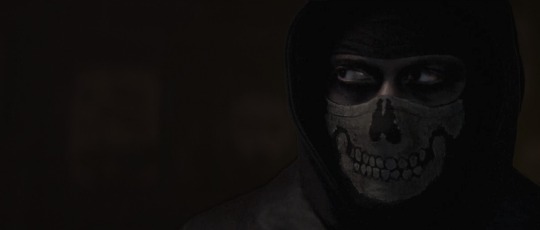
summary: Your daughter finally sees her father's face for the first time.
word count: 2.2k
warning/tag: Mostly just dad!Simon fluff with a little hint of angst. No gendering terms are directly used for the reader, but they are pretty fem coded. It's mentioned that they were pregnant. No use of y/n.

As the soft morning light filters through the curtains of your bedroom, you slowly begin stretching your limbs and blinking away the remnants of sleep. As you slowly settle into wakefulness, you hear the screeching sound of the baby monitor on your nightstand coming to life and you feel how your heart flutters happily in your chest as a familiar sound comes through. The sweet sound of your daughter’s happy coos, accompanied by Simon’s deep, gentle voice, fill the room with sweetness.
“Morning, sweet pea,” Simon’s voice crackles through the monitor followed by the sound of your baby happily gurgling at her father and then exclaiming a little more whiny sound. “Yeah, yeah, I know you’re hungry, but we have to get you changed before we can make breakfast, lovie.”
A smile tugs at the corners of your lips as you lie there, basking in the warmth and comfort of your bed. The love and joy that echo through the monitor remind you of just how much love fills your home. It’s moments like these that make your heart swell with an indescribable sense of happiness.
Your mind wanders, and you find yourself reminiscing about the journey that brought you here.
From the moment you and Simon first met, there was an undeniable connection, a spark that ignited and grew into a love that was both fierce and tender. However, it hadn’t been that easy to convince him that he in fact was deserving of such love. He had been scared that he would mess it up, mess you up, convinced himself that he wasn’t able to make anyone happy and that he was broken beyond repair. But you had been rather insisting, and he had finally let his walls crumble and let you into his heart.
And as you had expected, all his worries had been unfounded. He is the best, most loving partner you could ever have dreamt of.
The love you share with him is a love that feels like home.
And then, the arrival of your daughter added a new dimension to your love story. From the first time you had held her tiny hand, you knew that your family was complete. Watching Simon transform into the most loving and doting father has only deepened your admiration and affection for him.
And as you lie here, reminiscing on your life, you can’t help but feel a profound sense of gratitude for the love that surrounds you.
With a content sigh, you finally pull yourself out of bed, ready to start the weekend with your little family.
As you make your way down the stairs you can hear the sound of your daughter’s laughter from the kitchen, filling your heart with warmth and you can’t help but smile and make your way towards the source of the joyful commotion. As you enter the room, the morning sun gently illuminates the kitchen, casting a soft glow over the room, and you are greeted by a heartwarming sight. Simon is standing at the stove, stirring a pot of millet porridge, your daughter’s favourite, while she is sitting in her highchair, which has been moved away from the kitchen table and closer to the counter, so she can see what Simon is doing, clapping her hands in delight.
The aroma of freshly brewed coffee fills the air, mingling with the comforting scent of the porridge. You can’t help but feel a surge of immense love and gratitude for the man who stands before you, effortlessly balancing the roles of partner and father.
Simon turns towards you. “Good morning, love,” he greets you, his eyes twinkling with warmth, the bottom half of his face covered by a black mask. He had started to wear it around the house again after your daughter had been born.
“Good morning,” you reply, your voice filled with a mix of amusement and adoration. “I see you two are having quite the breakfast party.”
Simon laughs softly and nods. “We thought we’d surprise you with breakfast in bed, but it seems that someone couldn’t wait,” he says, glancing at your daughter, who just giggles in response.
You walk over to them, planting a soft kiss on Simon’s masked cheek before planting another on your daughter’s, much chubbier, one. “Well, I can’t say I’m disappointed. This is the best way to wake up,” you say, gazing at your little family with a heart full of love.
Together you finish cooking breakfast, porridge for the baby and scrambled eggs and turkey bacon for you and Simon.
You begin to set the table as Simon picks up your daughter, supporting her with one arm as he settles her on his hip, so he can move her chair back to the table, but before he can grab the chair he stops dead in his tracks.
Your little girl has grabbed a fistful of his mask in her tiny hand. She doesn’t seem to be pulling on it, or otherwise trying to take it off him, but she also doesn’t seem to want to let go of it when Simon gently takes her hand to get her to release her grip.
“Sweetheart, please…” Simon says softly, but he trails off, a wave of emotions flickering over his eyes, but they end up having a sort of determinant look to them as they lock with his daughter’s.
You feel how your heart skips a beat as Simon lets go of her little hand to instead grip the place his mask is fastened.
With a deep breath, Simon removes the mask, revealing his face to your daughter for the very first time in her young life. You feel goosebumps rise along your arms as Simon’s features come to light. The room falls silent, and time seems to stand still.
Your daughter’s gaze is fixed on Simon, you can see a whirlwind of emotions flickering across her little face.
It’s a pivotal moment that holds the power to change everything. You can see how Simon, too, feels a mix of emotions coursing through him.
He has once mentioned to you that he was afraid that his scars would scare her, but you have had a suspicion that something else might be the reason he has kept the mask on in front of her for.
He does have a few scars from his work, but they are nowhere near severe enough to scare anyone. You do have another theory to why he has kept it on, one he hasn’t directly confirmed, but a conversation from your pregnancy has stuck with you.
He had voiced his concern that something would happen to him on the battlefield. not because he was that concerned for his own wellbeing, he knew what the risks of his job was, but because he was afraid of something happening to him, leaving you and your little one alone in the world. He had, on the whole, had many worries about becoming a father.
He had been worried that his past had broken him so severely that he couldn’t be the dad your daughter needed him to be. Like the fear he also had about you and your relationship in the beginning of it, the fear that he couldn’t be the man you deserved.
He has, in all the time you’ve known him, done everything to disprove that concern, he is the best partner you could ask for and now the most lovable dad to your little girl, but you know that he still has his concerns and that his feelings about them are valid.
You think the mask has served as a sort of safety blanket for him. Like he thought that it would be easier for you and your daughter to lose him if your little girl couldn’t remember his face, or something like that. You find that thought heart rending.
You know that his job comes with a risk, you had known it when you got together and you had known it when you married him and you had known it when you got your daughter. Losing him on the battlefield would be your worst nightmare come true. You know that he is smart, strong and capable, but you also know that there are no guarantees in war, which, to you, is just all the more reason for your daughter to know her father’s face, but you have let Simon choose for himself when he was ready for that.
But you don’t want to think about any of that right now, so you push those thoughts away, and instead let yourself be completely mesmerised by the sight before you
Your little girl focuses on his, now revealed, face, taking in every detail. Her eyes widening in surprise, curiosity, and perhaps even a hint of fear, her little mouth forming a perfect ‘o’ of surprise as she absorbs every detail of her father’s face.
“It’s just me, princess,” Simon tells her, his voice filled with a mix of amusement, nerves and an overwhelming love for his little girl. His eyes, once guarded, now shine with warmth and affection.
The confirmation of his voice is what convinces her. A wide smile spread across her little face, revealing the adorable dimples she has inherited from Simon, on her sweet, chubby cheeks. She lets out a happy squeal, as she realises that it really is her father who’s now smiling down at her, a set of dimples matching hers on his cheeks.
She giggles happily, which, to you, is the most beautiful sound in the entire world. Her little hands starting to explore Simon’s face, her tiny fingers tracing the lines and contours of it. It’s a gentle and tender gesture that speaks volumes. You watch in awe as the beautiful moment between your daughter and her father unfolds in front of you. It’s a moment you will cherish forever.
When she finally seems satisfied with her mapping of his face with her small hand, she turns her head to look over at you with an excited expression on her little face, one that conveys something along the lines of ‘you seeing this too?’ Her eyes lighting up, reflecting the genuine joy that fills her little heart.
“Yeah, baby, that’s your daddy,” you smile at her, and she lets out another happy shriek before looking back at Simon again, happily nuzzling her little face into his neck. “He’s handsome, isn’t he?” You continue as you step forward, placing a hand on her back, rubbing gentle circles over the dusty rose bodystocking that she is wearing, one that Simon picked out when he got her ready and you still laid in bed.
You look up at Simon, a soft smile on his lips as your eyes lock.
“He never wants to believe me when I tell him, but he is actually the most handsome man I know,” you say, with a playful glint in your eyes. “He’s probably the most handsome man in the whole world, actually.”
Simon chuckles, his cheeks turning slightly pink. “Oh, come on now,” he replies, his voice a mix of embarrassment and amusement.“I think you might be a bit biassed there, love.”
You shake your head, a warm smile spreading across your face. “Nah, I don’t think I am,” you state, wrapping your arms around both Simon and your little girl in his arms. “Just stating facts. I actually got the most handsome husband and the most beautiful daughter in the whole wide world.” you say with a content sigh, hugging your little family tightly.
It’s a hug that speaks volumes, conveying love, affection and acceptance. In this embrace, you know that you truly have the most beautiful family in the world.
As you finally let go of them you place a sweet kiss on your daughter’s little nose. She giggles joyfully, and you can’t help but feel an overwhelming sense of gratefulness over what a happy little girl you have. Simon seems to be thinking the same as he smiles down at her.
But your adorable little troublemaker doesn’t seem to be done with causing havoc yet.
She reaches out her tiny hand and grabs for the mask again. Simon hesitates for a moment, looking down at the fabric in his hand, the symbol of his past, before letting her have it. The mask, once a symbol of his doubts and fears, now becomes a simple toy for your daughter as she happily shakes it up and down, a cheeky grin on her little face.
You and Simon lock eyes, and then the two of you burst out in laughter.
As your laughter fills the room, a sense of pure joy washes over you. You look at Simon, his eyes sparkling with happiness, and you know in this moment, that the love and bond the three of you share is unbreakable, and it fills your heart with an indescribable warmth.
With a deep sense of gratitude and contentment, you take a mental snapshot of this beautiful moment. It’s a memory that will forever be etched in your mind, a testament to the strength of your love and the joy that radiates from your little girl.
As the laughter subsides, you gather your family close again, embracing the love and happiness that surrounds you. In this embrace, you know that you have everything you could ever need.
Your daughter’s laughter and Simon’s unwavering love fill your life with immeasurable happiness, and you couldn’t be more grateful for the beautiful family you have created.
#springtyme writes#simon ghost riley x reader#simon riley x reader#ghost x reader#simon riley x you#simon ghost riley x you#simon ghost x reader#dad!ghost#ghost x you#dad!simon#ghost mw2#simon riley x f!reader#cod fanfic#cod x reader#cod mw2#cod fic#simon ghost riley#simon ghost riley fluff#simon ghost riley fic#ghost fluff#ghost fanfiction#ghost x yn#simon riley fluff#simon riley imagine#ghost imagine#simon ghost riley imagine#simon ghost x you#call of duty x reader#call of duty headcanons#call of duty fic
3K notes
·
View notes
Photo

#kimdirterorist #halkınıvuran #camiyegitmez #babasıyok #namusuyok #vatansız #dinsiz #imansız #keşfetteyiz #kesfet #discover #images #vatan #millet #bayrak🇹🇷 #islamic #islam #ezandinmezbayrakinmezvatanbölünmez🇹🇷🇹🇷🇹🇷🇹🇷🇹🇷🇹🇷🇹🇷🇹🇷🇹🇷🇹🇷🇹🇷🇹🇷🇹🇷 #torist #toprak #türkiye 🇹🇷🇹🇷🇹🇷🇹🇷🇹🇷🇹🇷🇹🇷🇹🇷 (Şehitler Ölmez Vatan Bölünmez) https://www.instagram.com/p/CiKHX3aAuvb/?igshid=NGJjMDIxMWI=
#kimdirterorist#halkınıvuran#camiyegitmez#babasıyok#namusuyok#vatansız#dinsiz#imansız#keşfetteyiz#kesfet#discover#images#vatan#millet#bayrak🇹🇷#islamic#islam#ezandinmezbayrakinmezvatanbölünmez🇹🇷🇹🇷🇹🇷🇹🇷🇹🇷🇹🇷🇹🇷🇹🇷🇹🇷🇹🇷🇹🇷🇹🇷🇹🇷#torist#toprak#türkiye
1 note
·
View note
Text
What Ukrainians ate to survive Holodomor
(translated excerpts from an Історична Правда article): + images source
The villagers would dig up the holes of the polecats to find at least a handful of grain hidden by these animals. They pounded it in a mortar, added a handful of oilcake (from hemp seed), beetroot, potato peelings, and baked something from this mixture.
Those who managed to hide at least a little grain would grind it in iron mills made from wheel axles and cook "zatyrukha" (a concoction made from a small amount of flour ground from ears of grain).
Acacia flowers were boiled and eaten raw, and green quinoa was mixed with crushed corn cobs. Those who could - and this was considered lucky - added a handful of bran. This food made their feet swell and their skin crack.
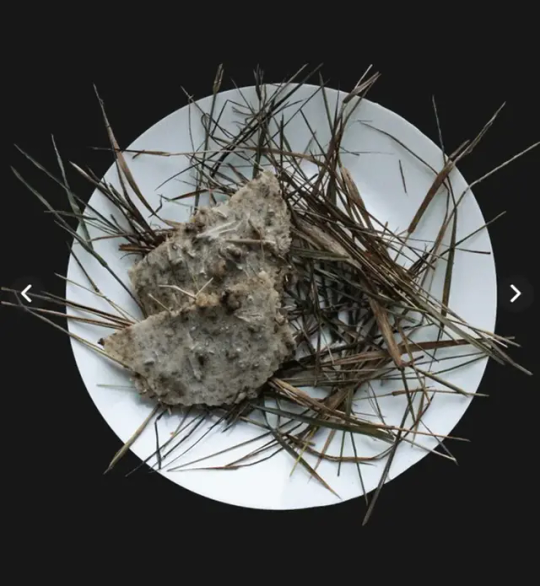
The peasants dried the husked ears of corn and millet husks, pounded them, ground them with weeds, and cooked soups and baked pancakes. Such dishes were impossible to chew, the body could not digest them, so people had stomach aches. Pancakes, the so-called "matorzhenyky", were made from oilcake and nettle or plantain.
It went so far that peasants would crumble straw into small chips and pound it in a mortar together with millet and buckwheat chaff, and tree bark. All this was mixed with potato peelings, which were very poisonous, and this mixture was used to bake "bread", the consumption of which caused severe stomach diseases.
There were cases when village activists took away and broke millstones, mortars, poured water on the heat in their ovens. After all, anything found or saved from the food had to be cooked on fire, and matches could only be purchased by bartering for their own belongings or by buying them in the city, which was impossible from villagers that were on "black lists".
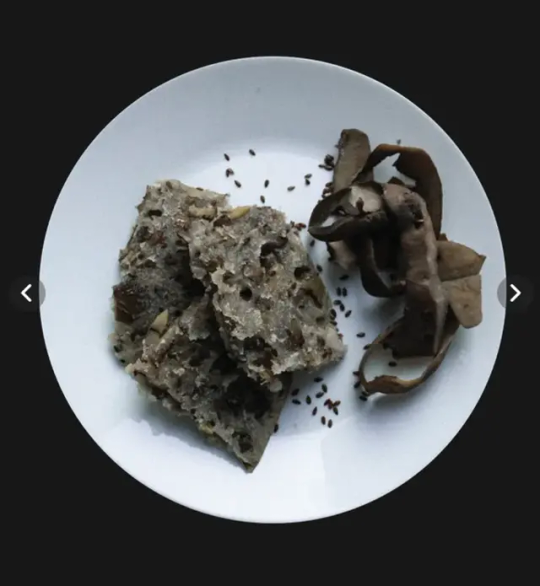
Chestnuts, aspen and birch bark, buds, reed roots, hawthorn and rose hips, which were the most delicious, were used as food substitutes; various berries, even poisonous ones, were picked; grass seeds were ground into flour; "honey" from sugar beets was cooked, and water brewed with cherry branches was drunk. They also ate the kernels of sunflower seeds.
Newborns had the worst of it, because their mothers had no breast milk. According to testimonies, a mother would let her child suck the drink from the top of the poppy head, and the child would fall asleep for three days.
In early spring, the villagers began to dig up old potato fields. They would bake dumplings from frozen potatoes, grind rotten potatoes in a mash and make pancakes, greasing the frying pan with wheel grease. They also baked "blyuvaly" (transl. "vomities") from such potatoes and oatmeal mixed with water, which was so called because they were very smelly.

They ate mice, rats, frogs, hedgehogs, snakes, beetles, ants, worms, i.e. things that weren't a part of food bans and had never been eaten by people before. The horror of the famine is also evidenced by the consumption of spiders, which are forbidden to kill in Ukrainian society for ritual reasons.
In some areas, slugs were boiled into a soup, and the cartilaginous meat was chopped and mixed with leaves. This prevented swelling of the body and contributed to survival. People caught tadpoles, frogs, lizards, turtles, and mollusks. They boiled them, adding a little salt if there was salt. The starving people caught cranes, storks, and herons, which have been protected in Ukraine for centuries, and their nests were never destroyed. According to folk beliefs, eating stork meat was equated with cannibalism.
The consumption of horse meat began in 1931, before the mass famine. People used to take dead horsemeat from the cemeteries at night, make jelly out of it and salt it for future use.

Dead horses were poured with carbolic acid to prevent people from taking their meat, but it hardly stopped anybody. Dead collective farm pigs were also doused with kerosene to prevent people from dismantling them for food, but this did not help either.
After long periods of starvatiom, the process of digestion is very costing for the human body, and many people who would eat anything would drop dead immediately out of exhaustion.
If a family had a cow hidden somewhere in the forest, they had a chance to survive. People living near forests could hunt/seek out berries and mushrooms, but during winter this wouldn't save them. People living near rivers could fish in secret, but it was banned and punishable by imprisonment/death.
681 notes
·
View notes
Text
bugna: TAKIPSILIM | destiny's twilight
CHAPTER ONE
Pairing: MCU Moon Knight System (Marc/Jake/Steven) x Avatar Fem!Reader
masterlist | previous | next chapter

CHAPTER ONE - SHADOWS OF THE PAST.
TWO MONTHS LATER…
The grandeur of your ancestral house in Guildford enveloped you as you strolled through its opulent corridors. Intricately carved wooden paneling adorned the walls, while rich crimson carpets absorbed the echo of your footsteps. The air is filled with the faint scent of polished wood and aged leather, exuding dignified timelessness.

Ascending the grand staircase, you run your hand along the mahogany handrail, feeling the smoothness of centuries of use. Reaching the landing on the second floor, a series of oil paintings greeted your vision. Painted by the likes of Van Gogh, Monet, Gauguin and Millet, each frame you passed through expressively telling stories of their lives’ hardships expressed through masterful strokes that evoked love, pain and unwavering resolve.
You finally reached a pair of imposing double doors, elaborately carved with intricate designs and gilded accents. Pushing them open, you step into your refuge within this grand manor. You took in the soft early afternoon light streaming through the lace curtains, the interior awash in soft, muted colors that evoke a sense of calm and serenity. The master bedroom itself bore an air of regal charm, with the walls adorned with exquisite silk wallpaper featuring delicate floral patterns. A four-poster bed draped in satin was situated at the very center, the bed linens made of the finest Egyptian cotton and the plump pillows neatly arranged in the head rest.
Seating yourself at the foot of your bed, your eyes caught a familiar oil canvas painting facing your direction - a self portrait of you dressed in a filipiniana gown while holding a soft-feathered fan on your right hand. Brief images of the very day you were painted flashed through your mind, remembering your shy, palpable smile as you took a graceful, elegant pose towards the handsome yet unrecognizable painter as his right hand carefully glided his paintbrush across the canvas.


You’ve been having these recurring dreams again as of late. But you cannot figure out for the life of you who the mysterious subject of your night recollections is.
Mildly shaking your head, you made your way towards your antique writing desk situated near a large bay window, overlooking the well-manicured gardens outside. The scent of freshly picked flowers finally distracted you from your musings, mingling with the aroma of polished wood. Carefully arranged, your flower vase was strategically placed beside an assortment of your night study essentials - an inkwell, quill pen, notepad, a hardbound copy of Atlas of Ancient Egpyt, and a work laptop with multiple tabs open.
Against one wall, a towering bookshelf houses an impressive collection of leather-bound tomes, each one a testament to your intellectual pursuits. You returned the hardbound copy of Atlas of Ancient Egpyt to its previous resting place, vowing to return to it after your overseas assignment. That book was an essential to you since you work full time as a museum curator for the British Museum. Back then, that career path wasn’t meant for your gender in the olden age. But as the world changes with time and equality between sexes have been more embraced, you found yourself living your life long passion of promoting cultural heritage and ancestral discovery.
Typing away at your laptop, you’ve mostly dealt with a lot of email exchanges involving procurement and acquisition of artifacts, record keeping and liaising with Egyptologists for the upcoming Ennead exhibition you’re organizing. You have already let most of your recent business contacts know that you’re on overseas leave, advising everyone to liaise with your secretary, Aleah Santos, in your absence.
A gentle knock on your door pulls you out of your reverie, your eyes now diverted towards the bedroom entrance. A middle-aged British man stands in the doorway with an air of quiet dignity, his appearance a testament to his impeccable service and professionalism. His face exudes an air of experience and reserve, befitting his role as the trusted steward of the household. He wears a perfectly tailored, immaculately pressed charcoal-gray suit with a crisp white shirt and a silk tie, and his salt-and-pepper hair was meticulously combed and styled to maintain a polished appearance.
His striking deep, intelligent blue eyes observed you quietly, framed by well-defined eyebrows that conveyed a sense of attentiveness. He was holding in one hand a tray with a steaming cup of Earl Grey tea and a blueberry scone, and a neatly pressed and folded set of smart, business casual clothes in the other. The fabrics were chosen with care and tailored to perfection, a testament to the older man’s meticulous attention to detail.
“Bill, how lovely to see you this afternoon”, you smiled appreciatively before standing, slowly reaching for your wardrobe in his arms. “Thank you for bringing these”
"It's my pleasure, Lady Carter", Bill answered politely, his refined British accent adding to his aura of sophistication. William Jones, who you affectionately nicknamed “Bill”, is the latest addition in the long line of the Jones household who have served the Carter family for a very long time. As the new head of the family estate, the depth of his loyalty to you runs deep and unquestioned.
"I've taken the liberty of preparing your necessities for the trip”, Bill said with a warm smile as he followed you inside, placing the tray of refreshments on your desk. “You'll find your travel documents and essentials ready in your briefcase, and I’ve packed you a suitcase for the three-day trip”
“What would I ever do without you?” you chuckled playfully, grateful for his unwavering efficiency.
“Years of service have taught me well”, Bill chuckled softly. “Now, if I may, I’d like to go over your schedule for the week.”
“Go ahead, I’m all ears”, you nodded, finally taking your first sip of the afternoon tea prepared. It was nothing short of exquisite, the fragrant steam wafting up to greet your senses. “Impeccable brew as always, by the way”
"I’m glad you like the concoction, Milady”, Bill nodded before clearing his throat, proceeding to recite the details of your upcoming trip. “Your flight to Chicago is later this evening at 7PM, and I will be driving you to the airport three hours prior”
You nodded, mentally ticking off the items on your mental checklist, as he continued to consult his notes and brief you.
“Upon your arrival to the United States, a valet service will pick you up and take you to your hotel. I made reservations at the one within walking distance of the family court where your next interpreting assignment will be running for three days”
“That’s good to hear”, you nodded, taking a small bite of the scone. “Have my secretary check on the tour guide headcount at the British Museum and handle the recruitment interviews while I’m gone”
“Understood”, Bill said curtly, finishing up writing on his notes. He gave a small bow before leaving the room. With his departure, you set to work on packing your travel essentials for your upcoming assignment.
The routine of operating as a freelance interpreter was familiar, accepting potential clients needing your services regardless of location. You cater mostly to the Filipino community, as it helped you fulfill your duties as Mayari’s avatar - to oversee, guide and protect her travelers of the night. Of all the careers you dabbled in your long life on this earth, being an interpreter and a museum curator were one of the very few roles you’ve had that you took immense pride in. Both navigated the complexities of language and history, bridging the gap between cultures and individuals.
The next morning after your arrival in the United States, the Chicago sun greeted you as you stepped out of your hotel room and into the bustling city streets. The scent of freshly brewed coffee wafted from a nearby café, tempting you, but duty called.
You found yourself before the imposing building of the Chicago Family Court in Cook County. It was a massive edifice of imposing architecture, and its walls seemed to resonate with the stories of countless families and their struggles. On your way to the court registry, you navigated the maze of hallways with purposeful steps. The walls were painted in muted tones, and the faint hum of conversation filled the air. Lawyers in tailored suits, stern-faced judges, and anxious family members all found their places. The court clerk finally checked you in after having you sign the log book, advising you of your assigned courtroom for your scheduled appointment.
You walked into the assigned courtroom, the polished wood of the benches and the imposing judge's bench before you. The judge’s gaze met yours as you approached the witness stand, acknowledging your presence as he had you sworn in. He instructed you to raise your right hand as you recited your oath, a solemn promise to faithfully and impartially interpret the proceedings for those who needed it.
“Thank you, Interpreter”, the judge nodded, your duty now officially recognized. “Please introduce yourself to the courtroom for the record”
“Yes, Your Honor”, you greeted in a clear, unwavering voice. “Good morning. My name is Mira Batala-Carter, and I will be serving as the Tagalog/Filipino interpreter for the witness in the stand”
The court proceedings began, and your voice filled the room as you translated the witness's testimony. You moved seamlessly between languages, ensuring that justice prevailed, one word at a time. The judge and attorneys watched you closely, appreciating your precision and dedication.
After the session concluded, you extended a hand to the witness, a kind-hearted woman who had been through a trying experience. She thanked you for your services, her eyes conveying a profound gratitude that words could not fully capture. As she left your presence, you muttered a silent prayer to your patron goddess, fulfilling your role as her avatar as you invoked a simple protection spell.
“Patnubayan mo ang guhit ng kanyang kapalaran, aking diwatang Mayari”
Guide the lines of her fate, my goddess Mayari.
As the proceedings unfolded over the next three days, you found yourself immersed in the world of legal battles, translating the words and emotions of those caught in the intricate web of the justice system. It was a demanding role, one that required not just linguistic proficiency, but also an acute understanding of human nature and the ability to convey the nuances of speech. Legal jargon and emotional testimonies flowed through you, and you remained resolute in your duty as an interpreter.
You arrived early on the last day of your interpreting assignment, finally giving in to your caffeine cravings as you clutch a cup of steaming coffee to ward off the chilly Chicago morning. You took a seat in the hallway, waiting outside the assigned courtroom. As you sipped your cappuccino and glanced around, your eyes landed on a man slouched on one of the benches, clearly taking a nap.
His face stirred a memory, one that danced tantalizingly out of reach. Yet you couldn't quite place where you had seen him before. He had a rugged handsomeness, an aura of enigmatic mystery that drew you in.
The man's companion, a woman of Arabic-Egyptian descent with a cascade of curly, dark hair, approached him, carrying a steaming cup of coffee. She leaned down, her concern etched on her face as she gently nudged him awake. She whispered something to him, and he stirred, blinking his eyes open.
Your heart clenched as you witnessed the tenderness in their interaction. The way their eyes met with shared history and unspoken understanding prompted a deluge of memories to flood your mind, unbidden and unexpected.
Like ghosts from the past, you heard sounds of laughter and shared secrets echoing inside your head. Your lips trembled as they seemingly remembered the tenderness of breathless kisses stolen beneath the moonlit sky. The details eluded you, but the emotions were vivid—joy, love, and a sense of belonging.
But as swiftly as those memories resurfaced, they slipped away like sand through your fingers, leaving you with an ache of longing and confusion.
Who was this man, and why did his presence stir such deep-seated emotions within you?
Before you could delve further into your thoughts, a call from Bill interrupted your reverie. You reached for your phone, the jarring ringtone pulling you back to reality.
"Lady Carter," Bill's voice came through the receiver, crisp and professional. "I have an important update from Miss Santos. We are still missing one more tour guide from the total headcount you require for the upcoming exhibition"
“Copy that”, you nodded. “Please have her finalize the applicants I’ll need to interview on Saturday”
As you hung up the phone, a court clerk emerged to announce that the morning proceedings will now begin. Finishing the rest of your coffee, you threw the empty cup at the nearby bin before entering the courtroom once more to complete the final leg of your interpreting assignment.
Unbeknownst to you, Mayari, the patron goddess of the moon, quietly observed from a distance as her ethereal, astral form shimmered from afar. Her eyes, filled with a sorrow you had never seen before, remained fixed on you as she recalled the most grievous of her sins—removing your image of Darius Carter and your memories of the events that had bound you to Khonshu's avatar, Moon Knight. She had acted with what she believed was your best interest at heart, but now, as she watched the remnants of your forgotten past resurface, doubt crept into her heart.
Mayari was determined to see her decision through to the end, to protect you from the darkness that lurked in the shadows. Yet, as she gazed upon the unfolding drama, the lines between right and wrong blurred, and the weight of her choices pressed upon her.
“Mr and Mrs Spector, please come to the front”
END OF CHAPTER ONE.
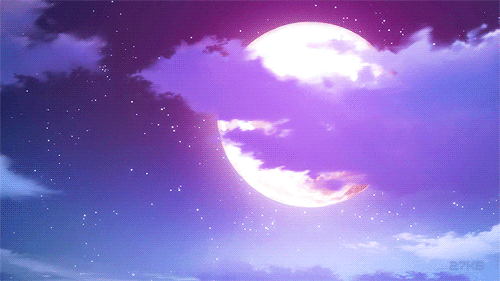
masterlist | previous | next chapter
#marc spector x reader#steven grant x reader#jake lockley x reader#moon knight#moon knight fanfic#moon knight fanfiction#moon knight x reader#marc spector#steven grant#jake lockley#mcu moon knight#marc x avatar f!reader#steven x avatar f!reader#jake x avatar f!reader#moon knight x avatar f!reader#philippine mythology#philippines#ancient egypt#egyptian mythology#pre colonial philippines#mayari#khonshu#anubis#moon knight system#layla el faouly
69 notes
·
View notes
Text
Speaking of liking Wilbour’s translation - I do not have Les Mis thoughts today (1.2.7), I only have favourite quotes.
He condemned society and sentenced it. He sentenced it to his hatred.
the word which the finger of God has nevertheless written upon the brown of every man: Hope!
a quick pallid flash which lit up his whole soul, and showed all around him, before and behind, in the glare of a hideous light, the fearful precipices and the sombre perspectives of his fate.
If a millet seed under a millstone had thoughts, doubtless it would think what Jean Valjean though.
All that had happened to him would appear absurd; all that surrounded him would appear impossible. He would say to himself: “it is a dream.” He would look at the jailer standing a few steps from him; the jailor would seem to be a phantom; all at once this phantom would give him a blow with a stick.
The image of Valjean physically holding up the balcony of the City Hall - the embodiment of governmental power - on his back is unquestionably symbolic.
17 notes
·
View notes
Note
OH DUDE I LOVED “Call Me Darling, I Come Running”, it was such a good rec, ty! Any similar fic recs? :)
In The Night Away We'd Fly by blackidyll (@blackidyll)
"People are starting to talk," Bond says, "about the young man who prefers the company of the dead in a deserted cemetery than the living, breathing villagers in the tea rooms that Millet prides itself on."
"I thought a gothic mystique fits in quite well with the image of a writer," Q replies. "Or did you have something else in mind when you professed me a poet?"
"I always associate you and your laptop with your office or lab, so – cluttered desk space, dim room lightning with only a single lamp on to illuminate your work, and a mug of tea for company. This—" Bond tilts his head to indicate the cemetery around them "—is a world apart from that environment."
"Is it?" Q smiles. "I find the solitude quite similar."
(When MI6 sends Q to the countryside for his own protection against Spectre's retaliation, it is not so much a short-term undercover assignment as it is a glimpse of an alternate life that Q could have had – just with the additional presence of one meddlesome Double-O agent).
~~~
fake relationship for official business is probably one of my fav tropes for them
2. Homemaking by SylvanWitch
Undercover as Bond's lover to root out a mole in MI-6, Q discovers that there is more to James Bond than sex and violence. Unfortunately, Q ends up with far more experience of the one than the other as they find themselves out in the cold, unable to trust anyone from the home office, and relying only on each other to uncover the identity of their deadly opponent.
~~~
character development AND betrayal!!!
3. Forget The Plan (Apparently) by SolarMorrigan (@solarmorrigan)
Bond and Q go undercover as a couple in order to get some information. Some creative problem solving takes place
~~~
you gotta love q playing the bond girl
#00q fanfiction#00q fanfic#00q fic#00q#quartermaster#00q fic recs#00q fic rec#fake relationship#mission fic#getting together#pining#pining james bond#pining james#pining!james#pining q#pining!q
42 notes
·
View notes
Text
[Kanto] [Johto] [Hoenn] [Sinnoh] [Unova] [Kalos] [Alola] [Galar] [Hisui] [Champs] [Paldea] [Paldea2] [Paldea3] [Teams] [Misc.]
Ya know who else I've totally neglected in this series of posts? The Battle Frontier bosses.

Anabel's name is LILA[リラ] from Lilac, hence her color scheme. That one's super straight forward.
Spencer's name was UKON[ウコン] from ukon[鬱金] the name for tumeric, a type of ginger root that is very popular traditional chinese medicine.
Noland's name was DATURA[ダツラ] from the genus of poisonous flowers in the Nightshade family, as well as other such charming common names as Devil's Trumpet, Hell's Bells, and Devil's Weed. They are all not only extremely poisonous but psychoactive
Brandon's name was JINDAI[ジンダイ] a neat pun as the common Japanese name of this cactus, jindai[神代], means "god time" as in "age of the gods/myth" in other words, "ancient," which of course lends to his role as Ruins Maniac/Pyramid King.
Tucker's name is HEATH[ヒース] which funny enough means he shares a namesake with Erika, and with Heath, aka HEATHER, Briar's ancestor that wrote the violet/scarlet book.
Greta's name is KOGOMI[コゴミ] from kogomi[屈] the Japanese name for the fiddlehead fern, used in cooking. They have a super distinctive curled shape which is where she gets her hair.
and then Lucy's name is AZAMI[アザミ] as in Azami[薊]: "thistle," appropriate for her prickly demeanor.

Technically I already did Darach's once, but I'll go over it again here. His name is KOKURAN[コクラン] as in kokuran[黒蘭], lit. "Black Orchid" and as a play on that Caitlin is actually named Cattleya[カトレア] from the Catelleya genus of orchids. His ancestor Anthe was named Sharon[シャロン] in reference to the Rose of Sharon, which is actually a common name of a few unrelated flowers, including the national flower of South Korea. (Oddly she seems to bear absolutely no relation to the Orchid theme between Kokuran and Cattleya. )
Argenta's original name was KEITO[ケイト] from keitou[鶏頭] the Japanese name for the Silver Cockscomb, which has very obvious color associations that lend to her design. Also the Silver Cockscomb's scientific name is the Celosia argenta, which is where they got her English name.
Palmer's name is KURUTSUGU[クロツグ] after kurutsugu[桄榔] the Kaong Sugar palm
Thorton's name was NEJIKI[ネジキ] from nejiki[捩木] the Japanese name of the Anyaar/Angeri(Lyonia ovalifolia). They have thee adorable little white bell flowers.
and finally for this batch, it's Dahlia who was in fact just named DAHLIA[ダリア]. For the image i picked a yellow Spider Dahlia specifically since it seemed to match her color scheme and hair

Oh and just to round out this little batch of extras, Barry's name is actually JUN[ジュン] from Junichi Masuda, game director of the core Pokemon series. It's a play on Gary's name being SHIGERU[シゲル], after Shigeru Miyamoto. But sadly it has nothing to do with his dad's name.
While I'm here...

Cheryl's name was MOMI[モミ] from momi[籾] which is a word that refers to unhulled rice specifically. Unrelated to her ancestor Wasabi's name.
Marley's name is MAI[マイ] from mai[米], which is just the word for "Rice" as a food staple, so depending on context it can implicitly mean when hulled, because the alternative would be momi, but it does also generally to the crop and even the food industry. (Ironically Mai in Hisui was actually named YONE[ヨネ] which is an alternate reading of the same kanji for "rice" [米], yet they named her Mai in English, Marley's actual Japanese name...)
Go figure, Buck's name is in fact BAKU[バク] and it's the Japanese word baku[麦] for Wheat or Barley. By sheer coincidence it is how Japanese phoneticizes "Buck" but it does not actually refer to Buck Wheat. Also he has nothing to do with his brother, nor their ancestor's names.
Mira's name is MIRU[ミル] from "Millet." It's also where her little hairtie design comes from.
and finally, Riley's name is GEN[ゲン] from genmai[玄米] the name for brown rice, which is a kind of earthier more nutritious rice.
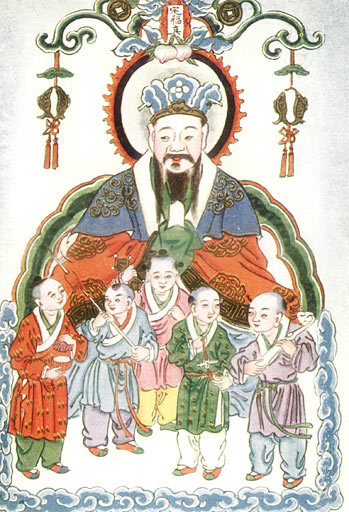
So oddly, there is a concept in Chinese agriculture and cooking called Wu Gu[五穀]: "The Five Grains" that refers to the 5 staple crops of Chinese agriculture dating back to ancient times, and several far et cultures have their own variations on this... but despite the obvious grain theming the 5 stat specialist trainers don't actually match any specific version of the 5 Grains?? It definitely feels like that was the intended reference, yet it sort of falls apart in the specifics... maybe just a disagreement on what made fora good name or not?
Oh and as for a few other oddball ancestors...

Sabi, Mai, and Zisu I've all technically covered before in one form or another but the quick overview is that Sabi was named WASABI[ワサビ], YONE we mentioned above, and Zisu was named PERILLA[ペリーラ], after the same type of redleaf mint that Flint, aka OBA[オーバ], was named after.
Pesselle's name is KINE[キネ] from kine[杵]: "(mortar &)pestel" which is both a cute play on Millet and on her role as head of the medical division and the grinding of medicinal herbs.
and Riley's ancestor Rye is actually named HAKU[ハク] as in haku[白]"white"but sensibly a reference to hakumai[白米]:"White rice" in parallel to Gen's gen[玄] also reading literally as "Black/Dark" when referring to "brown rice."
#pokemon#pokemeta i guess#pokemon emerald#pokemon dppt#pokemon hgss#pokemon legends arceus#hisui#sinnoh#hoenn#johto#battle frontier
8 notes
·
View notes
Note
🐗 Ya girl Fimeko
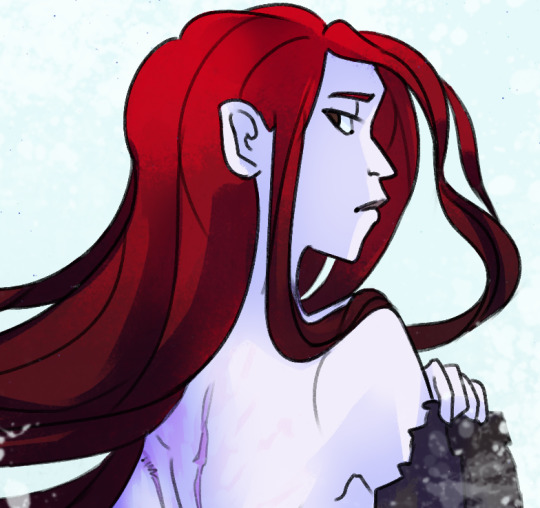
Including Image since you and wes have done so for yours so far
✨- How did you come up with the OC’s name?
According to my research, it is an archaic form of the name Himiko, which means "noble lady." A friend of mine pointed out that Fi is not a sound that exists in modern Japanese; this suits me just fine as she is from an original setting based on ancient Japan.
🌼 - How old are they? (Or approximate age range)
Fimeko is a little older than Kotone. Neither of them know their real ages, but to actually answer your question, 21-23 at the start of the story.
🌺- Do they have any love interest(s)?
Fimeko's sort-of-husband Naranbaatar. She is a slave in the court of a nomad warlord and he one of his soldiers; Naranbaatar helps her take control of the camp. A real wife guy. They never formally marry but she declares him to be her husband afterward which is good enough.
🍕 - What is their favorite food?
I've been meaning to make up food lore for the Shattered Kingdoms so here we go. There are a number of grains eaten throughout the land that come in the seven colors of the rainbow. The blue one resembles rice and the yellow one resembles millet. They can be mixed together to make a gummy green dough which is rolled out and sliced into noodles. Fimeko enjoys a soup made with peppers native to the plains, bone broth, and these rough, handcut noodles.
💼 - What do they do for a living?
Fimeko was originally a musician. She has since broken her koto and become a warlord.
🎹 - Do they have any hobbies?
Now that she's freed herself, Fimeko is taking up more traditionally masculine hobbies like horse archery and sowrdsmanship, because she believes violence is the answer. She still enjoys music, but has banned the koto from her court.
🎯🥊 -merging these
The thing she is unfortunately most talented at is playing the koto, which she hates. She loves to do violence and her husband.
❤️ - What is one of your OC’s best memories?
If you asked her she would say it's beating Lord Bakuto to death with her koto, but in her heart it's the first day she and Naranbaatar stole a kiss in private behind the lord's tent.
✂️ - What is one of your OC’s worst memories?
In her youth before she learned to play well, she would be punished frequently, often through beatings with a switch. Bakuto did not want her hands harmed so usually the strikes targeted her legs and feet, as one can play the koto sitting down. (sometime after she got good enough that punishments were infrequent, she was made to play standing)
🧊 - Is their current design the first one?
Yes, sorta. When creating her I paid little attention to her outfit; you, chesca, designed that, as well as her makeup
🍀 - What originally inspired the OC?
Reading about Queen Himiko, one of Japan's legendary rulers (according to China. They may or may not have been talking about Empress Jingu). She was allegedly a sorceress who came to the throne through manipulation and assassination, surrounded herself with female attendants, save for one man, who fed and bathed her. She is associated with fire in a lot of modern pop culture that features her.
🌂 - What genre do they belong in?
Water Maiden is a high fantasy but it dips its toes into political fantasy. She would do well in either.
💚 - What is your OC’s gender identity and sexuality?
Genderwise, cis. For sexuality, I can only say that she likes men. I will have to play with her more to see if she also likes women romantically.
🙌 - How many sibling does your OC have?
None that she knows of.
🍎 - What is the OC’s relationship w/their parents like?
Fimeko does not remember her father. Her mother is a person she cared about but rarely saw due to their situation; two slaves with different duties, kept in separate quarters. Her mother died when she was very young.
🧠 - What do you like most about the OC?
I like the arc I have planned for her, of going from a person with nothing to becoming a dominant power in the setting, the old nobody to nightmare route.
✏️ - How often do you draw/write about the OC?
I have not written very much about her in the last little while, other than revising her origin story a couple years ago. But Water Maiden is always on my mind.
💎 - Do you ever see yourself killing off the OC?
She is probably not going to outlive the novel, heh.
💀 - Does your OC have any phobias?
No but she is triggered by koto music.
🍩 -Who is your OC’s arch-nemesis or rival?
Kotone, the protagonist of the novel. They haven't met yet, but sparks will fly. In the non-sexy way. Probably. They were designed to be foils of each other, a blue water girl and a red fire girl, one sad and the other wrathful, strong reasons to hate the world but very different reactions to their respective situations.
🎓 - How long have you had the OC?
I wanna say I came up with Water Maiden in 2016, so 8 years.
🍥 - What age were you when you created the OC?
I was most likely 23. I actually came up with the core water maiden concepts about a week before my 23rd birthday but fimeko came about a month after.
4 notes
·
View notes
Note
You should share your irl Van Gogh lore fr
(Only if you want to, of course. I'm just curious about him and his life ^^)
OK I WILL GIVE U. A SMALL POSTER TOUR and give u some facts from what i learned from my research these past four days hehe
~~~
As a result of van Gogh being stuck in a creative rut after his time in Saint-Remy, he took artistic motivation from outside sources, like prints. Two posters I own are based off Jean Millet’s prints, First Steps and Sleeping Peasants.
The irises van Gogh painted were originally purple. The red pigments in the oil paint faded over time, as they’re sensitive to light. This left the irises blue instead.
The Almond Blossoms painting was precious to the whole van Gogh family, as it was painted in honor of van Gogh’s nephew, Vincent, being born. The flowering blossoms symbolize new life and hope.
Van Gogh’s paintings of sunflowers were meant to communicate gratitude to the people in his life. He painted five different sunflowers paintings.
Easily his most popular and most well-known painting, The Starry Night was considered a failure by van Gogh. The cypress tree in the forefront of the painting that, although rooted in the Earth, reaches for the heavens, represents immortality. Death is just another journey. (i LOVE analyzing this one OURGH it makes me cry)
What struck me about Irises is how chaotically the flowers are arranged. The painting portrays exactly how they grew, it doesn’t try to make them look more aesthetic. Van Gogh painted them as he saw them, clumsy and twisting and growing, but beautiful.
Van Gogh often used himself as a model to practice painting figures. Under some of his self-portraits, there’s another painting underneath, indicating that he reused canvases.
Bedroom in Arles has a flatter display to mimic the Japanese prints van Gogh appreciated so much. The walls and doors were previously violet, but because of the red pigment fading, are now blue.
I always loved how the light in Starry Night Over the Rhône shows life, and that even though it’s so far away, the reflections in the water still reach the viewer. To me, this painting says that no matter how dark it is or how far away you are, the light will still reach you.
His Shoes painting is very homey and domestic to me. It’s another one that displays beauty in simplistic, everyday things and I love that. Shoes were a common motif in van Gogh’s paintings, and this pair in particular is theorized to have belonged to Patience Escalier, who had previously posed for van Gogh.
Cafe Terrace at Night was a painting van Gogh described as a night painting without black. He was enraptured by the yellows, blues, and greens of the scene, and went right to painting even though it was nighttime.
In van Gogh’s letters to Theo about The Church at Auvers, he referenced Shakespeare’s representation of a church in Henry IV, which symbolized preaching that was lacking in spiritual understanding. “Their God is like the God of Shakespeare's drunken Falstaff, 'the inside of a church.’”
In Wheat Field with Cypresses, the most notable thing in this painting is the sky to me. I love how he painted the clouds as if they were moving within a still image. It’s like you can see the wind itself, not only against the sky but also in the plants.
In Green Wheat Field with Cypress, the way the plant life is painted reminds me of a river. It’s flowing in a horizontal direction without any clear path, growing clumsily and overlapping each other. It reminds me of Irises in a way, because it portrays nature exactly how it is without attempting to make it uniform.
6 notes
·
View notes
Text
Tilling the fields, QMYS, Section 1
The Qimin yaoshu齊民要術 (“Essential Techniques for the Common People) by Jia Sixie (fl. c. 540), is the oldest Chinese agricultural treatise to survive in its entirety. Jia Sixie served as a mid-level official of Eastern Wei,as such the focus is on the dryland farming practices of his home region in modern Shandong rather than the wet rice agriculture of Southern China. The book itself mixes Jia Sixie's own advise and descriptions with quotations from earlier works, many of which are now lost. The QMYS is therefore not just an important source for the author's own times, but for the agricultural writings and practices of the preceding centuries.
Section 1 covers the different aspects of tilling the fields in preparation for cultivation, and contains advise for how to clear new fields, ploughing, harrowing, different soil types, and so on.
(To go straight to the translation, jump to "Section 1, Tilling the Fields")
[Translator's preface]
[The QMYS is not illustrated, but texts of this nature really should come with some visual aides. I have therefore included here some drawings and pictures from later eras. All images from Wikipedia.
[Farming tools]
Han era scholars agreed that China's first plough had been a tool called leisi耒耜, but lacked a clear of concept of how it actually looked like. Later authors simply repeated their statements. The drawing below from Wang Zhen's (1271-1333) Nongshu is therefore at best a reconstruction from literary evidence.
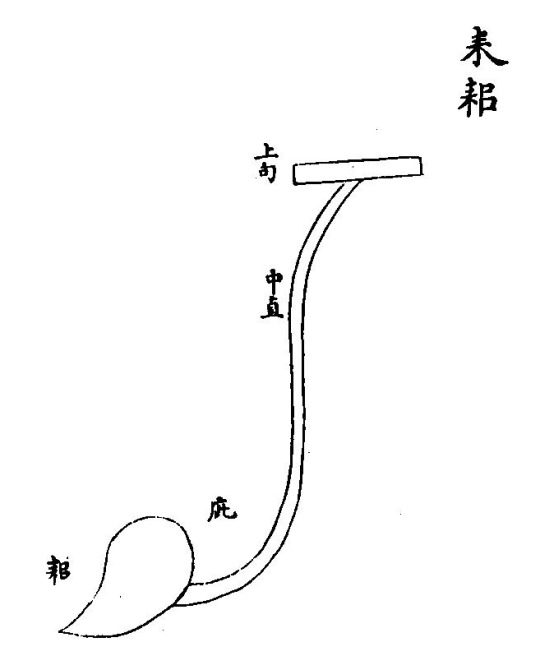
(Leisi耒耜, from Wang Zhen's Nongshu)
The main plough was instead the ox-pulled li犂 frame-plough.

(Li犂, from Wang Zhen's Nongshu)
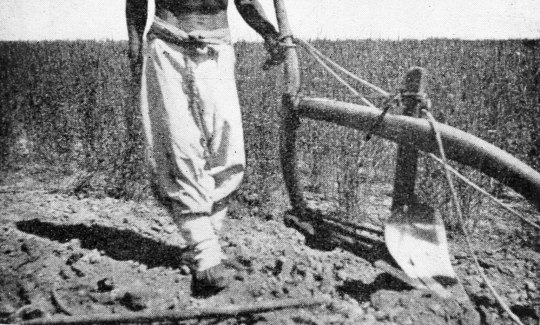
(Shantung plow, from King, 1911, Farmers of forty centuries)
QMYS also refer to the lighter feng鋒 plough.

(Feng鋒, from Wang Zhen's Nongshu)
The QMYS is the oldest Chinese text to refer to the iron-tined harrow, which it refer to as loucou𨫒楱

(Ba耙, from Wang Zhen's Nongshu)
The lao勞 bush-harrow was made by weaving thin sticks around the cross-bars.
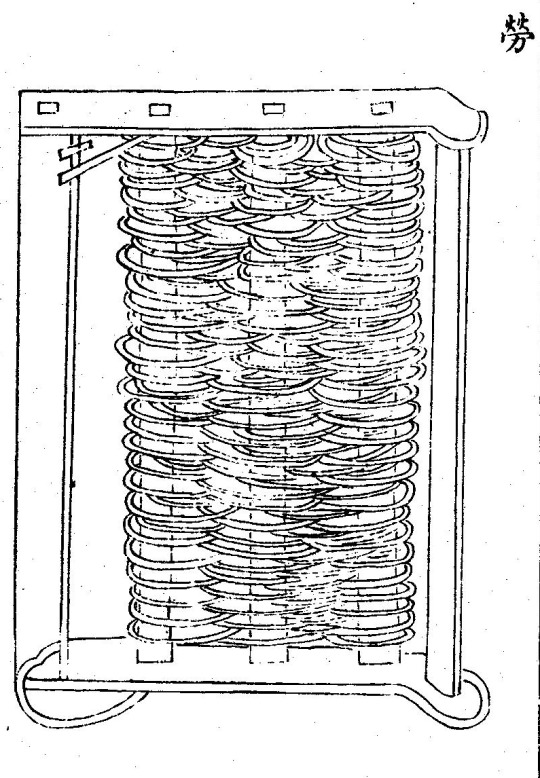
(Lao勞, from Wang Zhen's Nongshu)
The preferred tool for sowing was the seed drill, lou耬
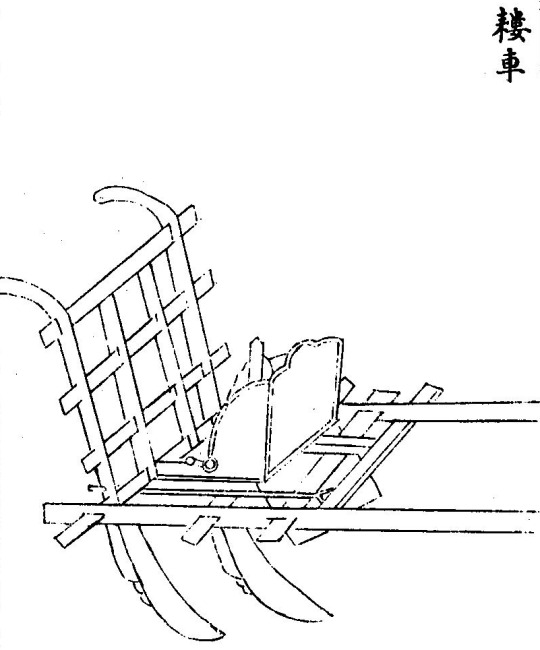
(Louche耬車, from Wang Zhen's Nongshu)
In addition to these ox-drawn tools, there were of course a varity of manual tools in different shapes and sizes, hoes, shovels, etc.
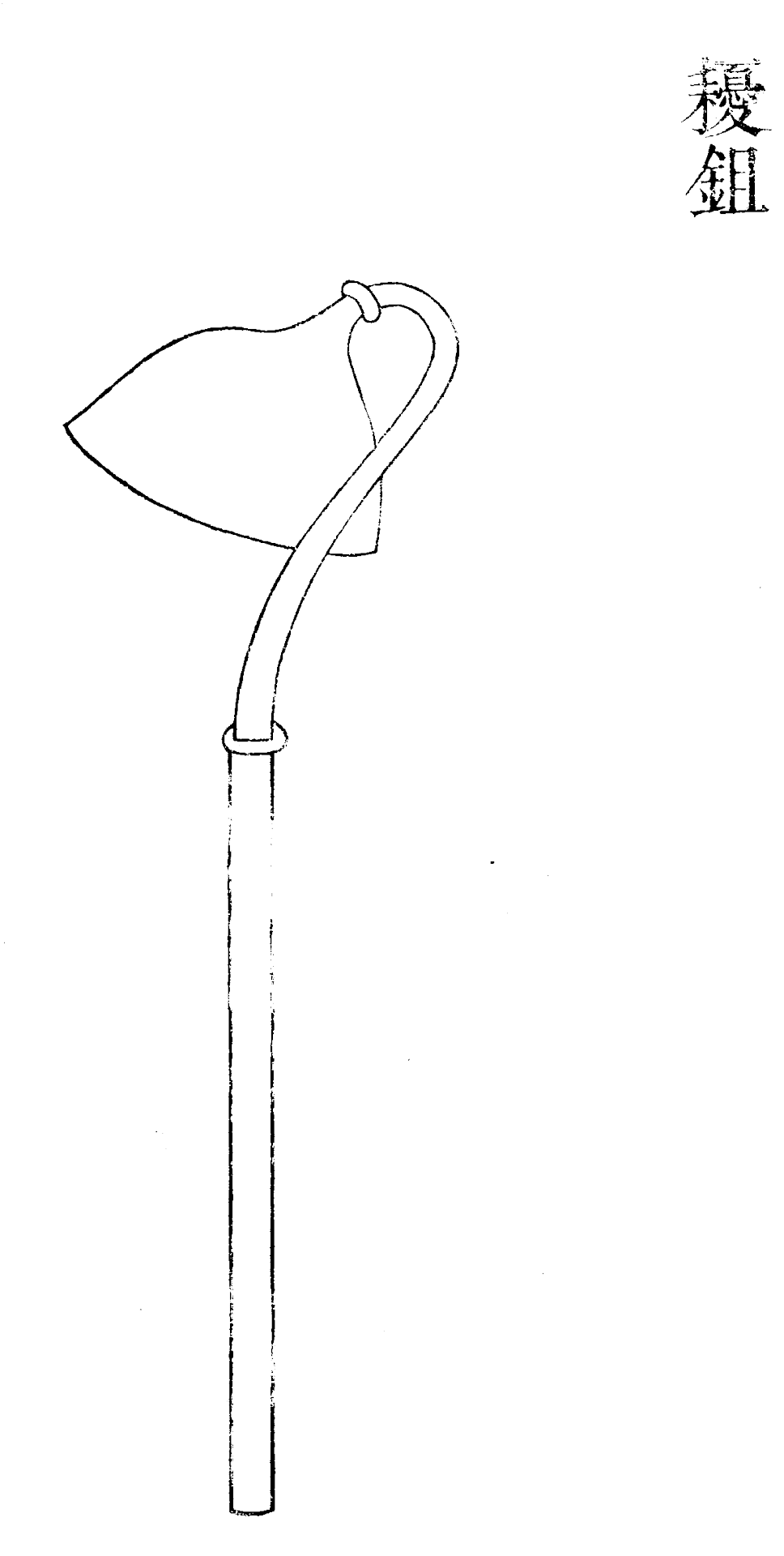
(Youchu耰鋤, from Wang Zhen's Nongshu)
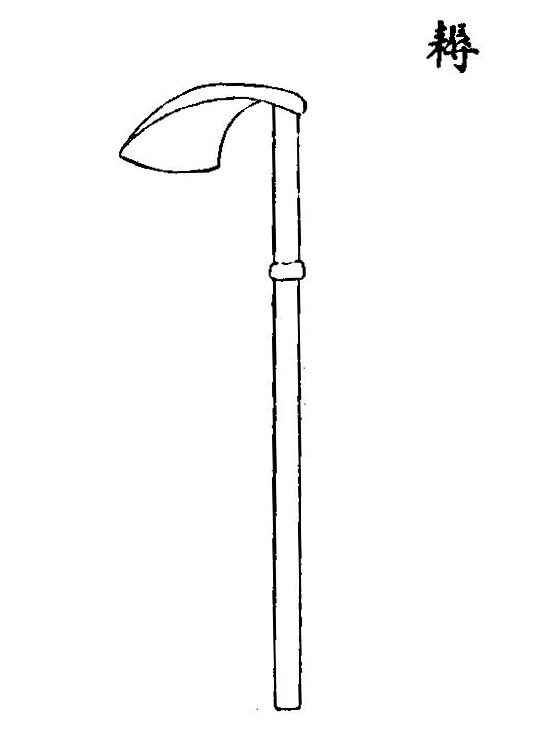
(Nou耨, from Wang Zhen's Nongshu)
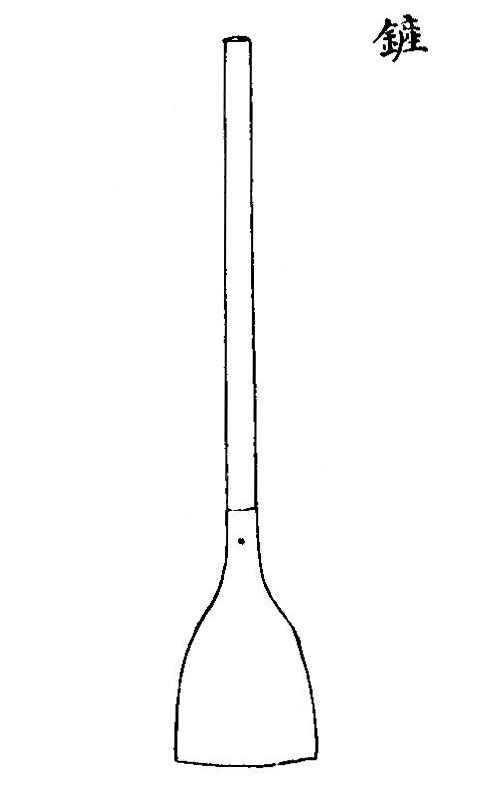
(Chan鏟, from Wang Zhen's Nongshu)
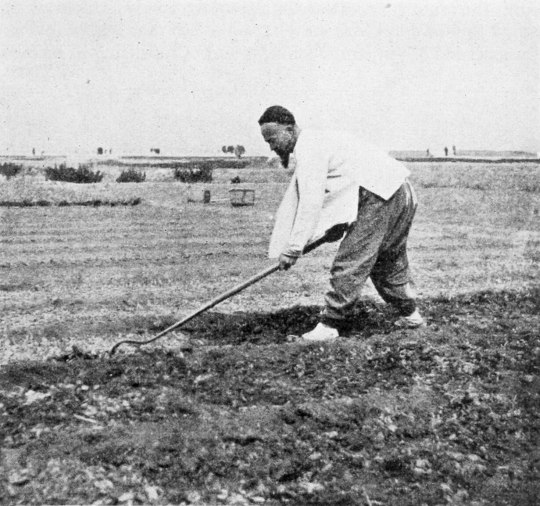
(Method of using the broad, heavy hoe in producing surface mulch, as seen in Shantung, China, from King, 1911, Farmers of forty centuries)
[Crop plants]
Later sections of QMYS treats the cultivation of the individual crops in much larger detail.
Foxtail millet (Setaria italica), gu穀, was the main staple crop.

Broomcorn millet (Panicum miliaceum), shu黍
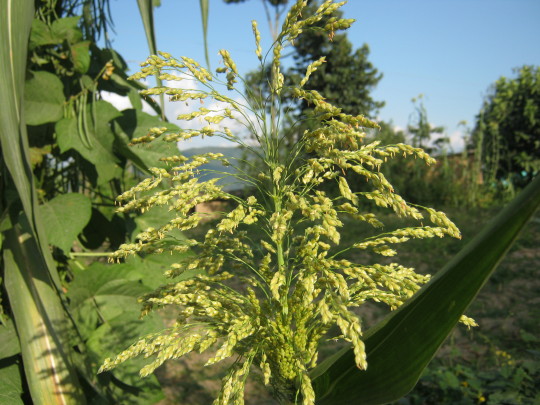
In addition to gu and shu, different varieties of foxtail and broomcorn millet were known under a large number of other names.
Mung beans or green gram (Vigna radiata), lüdou緑豆 (lit. "green beans"), used as green manure in crop rotation with millet

Adzuki beans (Vigna angularis), xiaodou小豆 (lit. "small beans") served a similar function
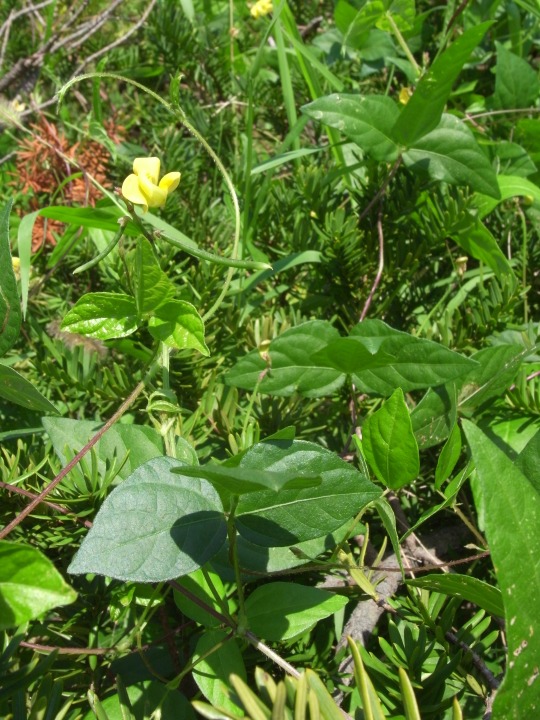
Wheat (Triticum aestivum), mai麥 (same name also used for barley) was primarily a winter crop in ancient China.

[Books quoted by QMYS in Section 1, in order of appearance]
The Zhoushu周書 (“Book of Zhou”), also known as the Yi Zhoushu逸周書, is a Warring States era collection of documents about Western Zhou, but the book has a complicated textual history. It is quoted once in QMYS, in Section 1. The quoted text is not found in the transmitted version.
The Shiben世本 (“Generational Roots”) records the genealogies of mythical rulers, the origin of the clan names, and mythological and historical inventors. Several versions existed, by different authors. The full text now lost, but it is quoted numerous times in other works. It is quoted once in QMYS, in Section 1.
The Lüshi chunqiu呂氏春秋 (“Spring and Autumn of Mister Lü”) is a collection of treatises and essays attributed to the retainers of Lü Buwei, the (in)famous Qin chancellor. It covers a very wide range of topics.
The Erya爾雅 (“Approaching the Correct”) is the oldest surviving Chinese glossary. Modern scholarship dates the book to the late Warring States and/or early Western Han periods. It is quoted numerous times in QMYS.
The Jianwei shiren犍為舍人, the “Retainer from Jianwei”, lived during the reign of Emperor Wu of Han and wrote a commentary on the Erya. The book is now lost. The quote in Section 1 is the first of three in QMYS.
The Zuanwen 纂文 (“Compiled Graphs”) by the Liu-Song scholar and historian He Chengtian何承天 (370 – 447) is now lost. It is quoted once in QMYS, in Section 1.
The Shuowen 說文 (“Explaining Graphs”) by Xu Shen許慎 (c. 58 – c. 147) analyses the composition and reasoning behind the different characters. It is quoted numerous times in QMYS.
The Shiming釋名 (“Analysing Names”) by Liu Xi劉熙 is a glossary in the style of the Erya written c. 200 AD. The quote in Section 1 is the first of three in QMYS.
The Liji 禮記 (“Ritual Records”) is a collection of ritual treatises compiled from older texts during Former Han, it became part of the textual canon as one the Five Classics and also as one the Three Ritual Classics. Its usage in QMYS is restricted to the Yueling chapter.
The Yueling月令 (“Monthly Orders”) chapter of the Liji is a calendrical treatise describing for each of the twelve months the position of the stars and other seasonal markers, important state rituals, and which activities should be undertaken in each month. Its inclusion in the Liji ensured it what read by every person aspiring to an education and it inspired a whole genre of similar texts, such as the Simin yueling. It is extensively quoted in QMYS.
Zheng Xuan鄭玄(127 – 200) was a famous scholar at the end of Han who wrote an influential commentary on the Three Ritual Classics. In QMYS quotations from the Yueling and Zhouguan are usually accompanied by quotes from his annotations.
Mengzi孟子 (“Master Meng”, theLatin Mencius) collects the teachings of the famous Warring States era philosopher Meng Ke (372–289 BC). The quote in Section 1 is the first of three in QMYS.
Wei Wen-hou魏文侯, Marquis Wen of Wei, ruled Wei during the early Warring States era. The single quote in QMYS attributed to him is found in the Huainanzi.
The Book of Miscellanea on Yin and Yang雜陰陽書 was apparently written during the early Han, but is now lost outside the quotations in the QMYS. The quote in Section 1 is the first of eight in QMYS.
Gao You高誘 lived at the end of Han and wrote commentaries on several texts, including the Lüshi chunqiu and the Huainanzi. The quote in Section 1 is the first of eight in QMYS.
The Huainanzi淮南子 (“Masters of Huainan”) is a collection of philosophical treaties compiled during Western Han at the court of Liu An (179 – 122 BC), vassal king of Huainan. It covers a wide range of topics. The quote in Part 9 is the second of nine in QMYS, the first being in the preface (which I have impudently skipped).
The Fan Shengzhi shu氾勝之書 (“Book of Fan Shengzhi”) is the oldest known Chinese agricultural treatise. Fan Shengzhi might originally have been an easterner, but during the early Western Han served as an official in the Guanzhong region. The original book has been lost, but it is extensively quoted in the QMYS, and also by Tang and Song encyclopedias.
Cui Shi崔寔 (d. c. 170) was a Han official and author of multiple works, including the Simin yueling and Zhenglun.
The Simin yueling 四民月令 (“Monthly Orders for the Four People”) is written in the style of the Liji Yueling, detailing each month's agricultural activities at the large estates of late Han North China. The original book is lost except as fragments in other books. It is very extensively quoted in the QMYS.
The Zhenglun政論 (“Essay on Government”) criticizes what Cui Shi considered the decline in morals and lax administration of law in his time. The original book is lost except as fragments in other books. It is quoted once in QMYS, in Section 1.
[Lettered notes]
The original text is a mix of large and small characters. I have collected the small text sections together in idented lettered notes within {} brackets.]
[Translation starts here:]
Section 1, Tilling the Fields
[Dictionary definitions]
The Book of Zhou says: “In the time of the Divine Farmer, Heaven rained millet [su粟]. The Divine Farmer thereupon tilled and planted it. He created pottery, cast axes and hatchets, and made the plough-shaft and ploughshare [leisi耒耜], the long- [chu鉏] and short-handle hoe [nou耨], to clear the grass and thickets. Afterwards the Five Grains supported and helped, and the Hundred Fruits were stored in abundance.”
The Generational Rootssays: “Chui created the plough-shaft and ploughshare. Chui was a vassal of the Divine Farmer.”
The Spring and Autumn of Mister Lüsays: “The ploughshare is six cun wide.”
The Eryasays: “To mow[qu斪] or weed[zhu斸] are spoken of as to settle [ding定].”
The Retainer from Jianwei says: “To mow or weed is to hoe [chu鋤]. They are names for settling.”
The Compiled Graphssays: “In the way of tending sprouts, the long-handle hoe [chu鋤] is not as good as the short-handle hoe [nou耨], the short-handle hoe is not as good as shovel [chan鏟]. A shovel is two chi long, with a blade two cun wide, and is used to level the ground and remove grass.”
Xu Shen's Explaining Graphssays: “The plough-shaft [lei耒] is for hand-tilling with a curved wood. The plough-share [si 耜] is the plough-shaft's straight end. The weeder [zhu斸] is for cleaving [zhuo斫]. In Qi they speak of it as the ziji鎡基. Some say the axe handle [jinbing斤柄] is curved by nature. A field [tian 田] is laid out [chen陳]. Where is planted grain is called a field. [The graph] resemble four 口, and the 十 is the pattern of paths and cross-paths. To till [geng耕] is to plough [li犂]. [the graph] comes from “plough-shaft” 耒 with the “well” [jing井] sound. Some say it is the ancients' well field [system.]”
Liu Xi's Analysing Names say: “A field [tian田] is full [tian填]. The five grains fill up within it. A plough [li犂] is profit [li利]. To profit, turn over the soil and cut off the grass at the root. The short-handle hoe [nou耨] resembles hoeing [chu鉏], with crouched back hoe among the stalks. To weed out [zhu] is to execute [zhu誅] someone. The ruler uses execution to dig up a matter at the root.”
[General advise]
In general, when opening uncultivated mountain and marsh fields, always in the 7th Month cut down and mow them. When the grass has dried, set fire to it. Arriving at spring, begin to clear out those of its groves where the wood is large, peel off the bark to kill them. When the leaves are dead and not casting shadow, they will readily yield to tilling and planting. After three years, when the roots have withered and the stalks decayed, use fire to burn them (entering the ground fully), till the uncultivated land to the end, and use an iron teeth loucou𨫒楱 harrow to rake it twice everywhere, hurl broomcorn non-glutinous millet, and bush-harrow [lao勞] it again twice everywhere. Next year then it is fitting to be a millet field.
In general when tilling eminent or inferior fields, do not ask about spring or autumn, [you] must pay attention to dry or wet to obtain what will be good. If flood and drought are not in concert, it is better with dry and not wet {A}. For the spring tilling, immediately take in hand the harrowing{B}. For the autumn tilling, wait for the turn to white to harrow{C}. [When the soil starts to dry, the surface turns white, which Jia Sixie refers to as 白背.]
{A: With dry tilling, then even if there are earth-clods, as soon as there is rain, the earth will pulverize and dissolve. With wet tilling, it will harden when it dries, and for several years will not be good. The proverb which says: “Wet tilling and damp hoeing is not as good as going home.” tells that it is of no gain and will be damaging. In the case of wet tilling, when it turns white quickly use the loucou on it, and there will likewise be no injury. If not done, it will be very bad.}
{B: The ancients said you耰, now we say lao勞. The Explaining Graphs says: “The you is a tool for rubbing [mo摩] the fields.” Now people also name the lao bush-harrow a “rubber” [mo]. A vulgar saying is “till the field with the rubbing harrow”.}
{C: During spring, there is much wind, and if [you] do not soon harrow, the earth will surely be empty and dry. During autumn the fields are soaked solid, and wet harrowing will make the earth stiff. The proverb which says: “To till and not to harrow is not as good as making it go to waste” perhaps tells that wetlands are difficult to handle, and delights in Heaven's timely chances. Huan Kuan's essay on Salt and Iron says: “Underneath a thick grove there is no lush grass. Between large clods there are no excellent sprouts.”}
In general, autumn tilling want to be deep, spring and summer tilling want to be shallow. Ploughing want to be narrow, harrowing want to be double{D}. In the autumn to till and cover over what is green is the best.{E} The earliest tilling want to be deep, and the turned over earth want to be shallow.{F} On land with themeda or cogon-grass [jianmao菅茅], [you] ought to let loose cattle and sheep to trample it. Then if in the 7th Month [you] till it, it will die{G}.
{D: Plough narrow and till finely, the ox then will not tire. Double-harrow and the land will ripen, during drought it will likewise protect the moisture.}
{E: Reaching the winter months, the green grass that has regrown will be as excellent as adzuki beans [xiaodou小豆].}
{F: If the tilling is not deep, the land will not ripen. If the turned over is not shallow, the stirring will bring forth the soil.}
{G: If not the 7th Month, it will regrow.}
In general, the rule for excellent fields, is for mung beans [lüdou緑豆] to be first, adzuki beans and sesame [huma胡麻] is next to it. Thoroughly for all of them sow densly [?] within the 5th and 6th Months, and in the 7th and 8th Month plough and cover over to kill them. [This] will make a spring millet field with a harvest of ten shi on the mu, in excellence comparable to silkworm excrement and mature manure.
In general, after the autumn harvest, the oxen's strength will be weak. For those not yet caught up for autumn tilling, at the bringing down of [?] the foxtail [ gu穀], glutinous broomcorn [shu黍], non-glutinous broomcorn [ji穄], large grained [liang 粱], and glutinous foxtrail [shu秫]millets' stubble, then move the exhausted ones to quickly use the “spear-point plough” [feng鋒] on it. The ground is regularly soft and moist, and is not hard and tough. Then when arriving at the beginning of winter, [you] usually get to till and harrow, and not worry about it being dried up and arid. If the oxen's strength is small, only harrow it once during the 9th and 10th Months, and arriving at spring, sow without ploughing [?], is also doable.
[Excerpts from the Monthly Orders on tilling]
[This whole subsection consists of quotation from the classic text the Monthly Orders [Yueling 月令], a chapter of the Ritual Records [Liji禮記], accompanied by quotations from commentary by the Eastern Han scholar Zheng Xuan.]
The Ritual Records' Monthly Orderssays: “In the Month of First Spring, … the Son of Heaven therefore on the inaugural day pray for grain to the High God [shangdi上帝]{H}. Then, selecting the inaugural chen day, the Son of Heaven personally conveys the plough-shaft and ploughshare. … He leads the Three Excellencies, the Nine Dignitaries, the various feudal lords, and the great men, to till themselves the God's Acre [Di ji帝籍]{I}. This Month, Heaven's breath descends down and Earth's breath rises up. Heaven and Earth are in harmony with each other, and the grasses and trees sprout and stir{J}. … He instructs the ministers for the fields{K}. They skilfully assess the hills and mounds, the slopes and defiles the highlands and lowlands, for what is suitable among the land and ground, and what to plant of the Five Grains, so as to teach and guide the people. … Field affairs having been put in order, he first settles the guidelines and responsibilities. Agriculture was therefore not in confusion. ...”
{H: Zheng Xuan's Annotations says: “It speaks of the first xin day, and the suburban sacrifices to Heaven. The Spring and Autumn Transmittals says: 'In spring the suburban sacrifices to the Lord of Agriculture [Houji后稷] to pray for farming affairs. Thus after the commencement of hibernation, the suburban sacrifices. After the suburban sacrifices, the tilling.' The High God is the god of the Grand Tenuity [taiyi太微].”}
{I: “Inaugural chen is perhaps a propitious chen day after the suburban sacrifices. … The God's Acre is the field by which is regulated the Heavenly Divinity's lending the people strength.”}
{J: “This is the yang breath ascending through the surface, a portent that there can be tilling. The Book of Agriculture says: 'For the best growth cover over the stakes. When they show the base and can be pulled out, those who till urgently set out.”}
[This Book of Agriculture [nongshu農書] is apparently the same as the Book of Fan Shengzhi which is quoted in more detail on this topic further down.]
{K: “With minister it speaks of the 'field surveyors', the officials in charge of agriculture.”}
“In the Month of Middle Spring, … those who till have a short rest, they then repair their gate and door leaves [heshan闔扇]{L}. There are no great affairs undertaken which would hinder agricultural affairs. … ”
{L: 'Rest' [she舍] is similar to 'pause' [shi止]. Hibernating insects open doors, and with tilling affairs a little tranquil, they then put in order their gates and doors. When they use wood it is called he闔, when they use bamboo or reeds it is called shan扇.”}
“In the Month of First Summer, … he encourages agriculture and motivates the people, and there are not anyone who neglects the season{M}. … He instructs the farmers to apply themselves to action, and not rest at the capital{N}. ...”
{M: “He puts weight and effort in encouraging [them?] to come to him.”}
{N: “He presses and urges the farmers. … The Rites for the King Residing in the Bright Hall says: 'There are no sojourners in the state'.”
“In the Month of Last Autumn, … The hibernating insects altogether curl up inside, and everyone plaster their doors.{O}”
{O: “With 'plastering' [jin墐] it speaks of smearing plaster [tu塗] to shut them. This is to avoid the killing[?] air.”}
“In the Month of First Winter, … Heaven's breath rises up and Earth's breath descends down. Heaven and Earth do not communicate, they shut up and hide, and achieve winter. … He encourages the farmers to rest and comforts them{P}. …”
{P: “'The Ward Corrector [dangzheng黨正]' 'drinks wine with the people belonging to him, and correctly arrays their ranks.'”} [Zheng Xuan here quotes from the Rites of Zhou]
“In the Month of Middle Winter, … ground affairs are not undertaken, care is taken not to open up what is covered, and not to open rooms and buildings. … [otherwise] the Earth's breath would further spill out, this is spoken of as opening the house of Heaven and Earth. The various hibernating [insects] would then die, and the people would be ill and sick{Q}. …”
{Q: “When the Great Yin employed in affairs, it especially puts weight on closing up and keeping safe.” Note that in the present era's tilling in the 10th and 11th Months is not straightly disobeying the Way of Heaven, and harming hibernating insects. [If] the earth likewise was not made moist, the harvest would surely be meagre and small.}
[The words “Note … small” are not part of Zheng Xuan's commentary, but are rather Jia Sixie's own comments.]
“In the Month of Last Winter, … he instructs the field officials to announce people to bring out the Five Seeds{R}. He instructs the farmers to plan their plough-pairs and tilling affairs, repair their plough-shafts and -shares, and prepare their field tools{S}. … This month, the sun has gone through the stations, the moon has gone through the positions, and the stars have cycled around Heaven. The numbering is soon about to end{T}. The year will once more begin. Pay attention to your farming people, and do not have them sent about{U}.”
{R: “He instructs the field officials to announce to the people to bring out the Five Seeds. The great cold has passed by, and farming affairs are about to begin.”}
{S: The ploughshare [si耜] is the metal of the plough-shaft [lei耒]. The ploughshare is five cun wide. Field tools are the types of hoes [ziji鎡錤].”
{T: “It tells that the sun, moon, and stars have travelled around until this month, when they all have made a circuit to their old locations. The 'stations' [si次] are the lodges [she舍]. The 'positions' [ji紀] are similar to lodges.”}
{U: “er而 [“thy”] is similar to ru汝 [“you” or “your”]. It tells to pay attention solely to the hearts of your farming people, and make people prepare their resolve for the affairs of tilling and sowing. It is not possible to conscript them for labour. If conscripted for labour, their resolve will scatter, and they will neglect their profession.”}
[Other quotations on tilling]
Master Meng says: “A gentleman's assignment is like a farmer's tilling.”{V}
{V: Zhao Zhu's annotations says: “It tells that to be hasty in your assignment, like a farmer who does not till, is impossible.”}
Marquis Wen of Wei says: “People in spring put their effort into tilling, in summer use their strength for weeding, and in autumn they gather their harvest.”
The Book of Miscellanea on Yin and Yang says: “When on hai亥 it is in the Heavenly Granary constellation, it is the start of tilling.”
The Spring and Autumn of Mister Lü says: Fifty-seven days after winter solstice, sweet flag [chang昌] grows. Sweet flag is the first to grow of the hundred hundred grasses, and at this point tilling starts.
The Masters of Huainan says: That which does the affairs of tilling is toil, that which does the affairs of weaving is trouble [?]. They are affairs of toil and trouble, yet those people who do not rest know they can be used for clothes and food. A person's feelings are not capable of being without clothes or food. The way of clothes and food surely starts at tilling and weaving. … Those who, if they till and weave, who will start at the beginning with considerable toil, and end with certain profit, are the multitudes.
It also says: “To be unable to till and yet want glutinous broomcorn or large grained millet, to be unable to weave and yet want to sew attires, to have nothing in their affairs and yet seeking their merit, is difficult.”
[Quotations from Fan Shengzhi]
The Book of Fan Shengzhisays: “In general, the root of tilling lies in determined timeliness, harmony with the ground, applying oneself to manure and moisture, and to hoe early and harvest early.”
“At spring when the frost disperse, Earth's breath starts to permeate, and the soil's sole harmony disperse. At the summer solstice, Heaven's breath starts to heat, the yin breath starts to flourish, and the soil again disperse. Ninety days after summer solstice, when day and night are split, Heaven and Earth's breath are in harmony. Using these times to till the fields, one will yield five, which is called fertile bounty, all then are times for work.”
“At spring when the Earth's breath permeates, [you] can till the hard and tough earth with black, lumpy soil, immediately level and rub down its clods to give growth to grass. When the grass grows, again till it. When the sky has a little rain again till and harmonize it. Do not make that which has clods await the season. This spoken of as 'if strong soil, then weaken it'.”
“A spring portent that the Earth's breath has started to permeate: Hammer down wooden stakes, a chi and two cun long, cover over a chi [so that you] see two cun. After the advent of spring [lichun立春], the soil clods will break up, and the top will slide down the stakes. When they show the base, and can be pulled out, after twenty days from this time, the harmonious breath will leave, and promptly the soil will stiffen. With timely tilling, one will yield four; till when the harmonious breath has left and four will not yield one.”
“When the apricots start to flower and flourish, immediately till light soil and weak soil. Wait for the apricot flowers to fall off, and then till again. Till and immediately roll it [lin藺]. When grass grows, and there is rain and moisture, till and heavily roll it. For soil that is particularly light, use cattle and sheep to trample it. Like this the soil will strengthen. This is what spoken of as 'if weak soil, strengthen it'.”
“If at the spring breath is not permeated, soil fully fitting will not protect its moisture, and for the remainder of the year will not be suitable for sowing, and no manure will not dissolve [?]. Take care to not till dry land. Wait for grass to grow, and to arrive the time it can be tilled. When there is rain, promptly till it, The soil will be close with each other, sprouts only will grow, grass and weed will rot, and [you] will always achieve good fields. This way one tilling will yield five. If not done like this, but dry tilled, clods will be tough, sprouts and weed will spring forth from the same hole and will be impossible to hoe into order, and and it will turn around to become failed fields. If in autumn with no rain [you] yet till, it will sever the soil's breath, and soil will be hard and dry. These are called 'arid fields' [latian臘田]. And when you till in severe winter, [you] will leak out the yin breath, the soil will wither and dry out. These are called 'parched fields' [futian 脯田]. Arid fields and parched fields are both wounded fields. If for two years they do not produce sheaves of grain, then rest them for a year.”
“In general wheat [mai麥] uses the 5th Month for tilling. The 6th Month is second for tilling, and in the 7th Month [you] must not till. Carefully rub and level to await the time for sowing seeds. Till in the 5th Month, one will yield three. Till in the 6th Month, one will yield two. If tilled in the 7th Month, five will not yield one.”
“In winter when the rain and snow has stopped, immediately roll it down. Trap the snow in the soil, and do not cause the following wind to fly away with it. If it snows later, roll it down again. Then at the advent of spring, it will protect the moisture, freeze the insects to death, and the coming year will be suitable for sowing.”
“Obtain the harmony of the season and fit to what is suitable for the land, then even if the fields are meagre and bad, the harvest can be 10 shi on a mu.”
[Quotations from Cui Shi]
Cui Shi's Monthly Orders for the Four Peoplesays: “1st Month, Earth's breath rises up. For the best growth cover over the stakes. When they show the base and can be pulled out. Hasten to cultivate fields with strong soil and black lumps. 2nd Month, Yin's frost is entirely moist. It is possible to cultivate excellent fields with slow soil and the small places by the river banks. 3rd Month, when apricot flowers are abundant, it is possible to cultivate fields with sandy, white, and light soils. 5th Month and 6th Month is is possible to cultivate wheat fields.”
Cui Shi's Essay on Governmentsays: “Emperor Wu used Zhao Guo as Chief Commandant of Searching for Millet, to teach the people tilling and planting. In his method there was three ploughshares [li犂] together for one ox, with one person escorting it, putting down seeds, pulling the seed-drill [lou耬], and in everything taking up preparations for it. In a day he sowed 1 qing. Arriving at present Sanfu [the region around Chang'an], they still rely on its advantages. Now in Liaodong when they till and plough, the shafts are four chi long, the rotations interfering with each other. Then they use a pair of oxen, a pair of people to lead them, one person in charge of the tilling, one person to put down seeds, and two people pull the seed-drill; in total they use a pair of oxen and six people, and in one day they only sow twenty-five mu. They are isolated [?] in the extreme like this.{W}”
{W}Note for three ploughshares together for one ox is similar to the present three-footed seed-drill, why the unknown tilling method? Now from Jizhou濟州 and westward they still use the long-shafted plough and the two-legged seed-drill. Long-shaft tilling on level ground is just about possible, but between the mountains and brooks, [the ground] does not permit its use, moreover the rotations are extremely difficult and costly in strength. It is not the equal the flexible ease of Qi people's luxuriant[?] ploughs. The two-legged seed-drill sows dense ridges, and is likewise not as good for hitting the mark as the one-legged seed-drill. [This seems to be Jia Sixie's own comment to Cui Shi's text.]
8 notes
·
View notes
Text
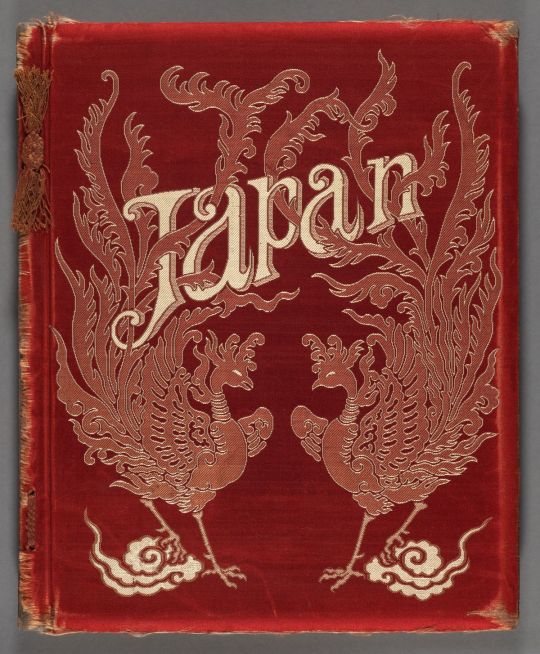
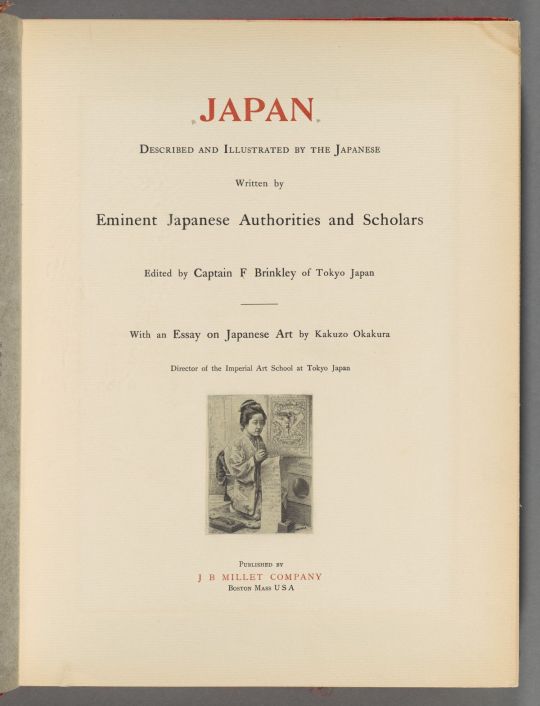

We’re back from a long break! Sorry for the long silence but we’re happy to be back again.
This summer, we launched a new website for Early Photography of Japan. It is a virtual collection of more than 40 souvenir photograph albums and illustrated publications from Japan with over 2,000 images from Widener Library, the Fine Arts Library, and Harvard-Yenching Library. In celebrating this new website, we’re posting several images from the Fine Arts Library’s collection.
Japan: Described and Illustrated by the Japanese – Part 1
In 1896, Tamamura Kozaburo, a highly successful commercial photographer in Yokohama, received an order from a Boston publisher that would eventually lead to the production of more than one million hand-colored albumen prints. At a time when most publishers were using illustrations produced via cheaper and faster photomechanical processes such as collotype or halftone, J. B. Millet Company used original photographs to illustrate no less than 16 different folio editions of the multi-volume Japan: Described and Illustrated by the Japanese published between 1897 and 1898. The publisher limited the most exclusive editions to 25 sets available by subscription only, along with larger editions numbering 750 to 1000 sets.
The key figures in this undertaking included a Boston publisher, an expatriate Irishman, and a Japanese photographer. Harvard graduate Josiah Byram Millet (1853-1938) founded his publishing company in 1890, and like many in the Boston area, he became interested in Japan, learning to speak the language and developing close connections to many Japanese statesmen, scholars, and businessmen. He conceived the idea for Japan: Described and Illustrated by the Japanese and used his connections to secure financial backing for the project from the Japanese government.
Stay tuned for our future posts!
From Japan: Described and Illustrated by the Japanese
Image 1: Front cover
Image 2: Title cover
Image 3: Page XI, showing Mt. Fuji
Description Brinkley, F. Japan :described and illustrated by the Japanese. Boston : J. B. Millet Company, 1897-1898. Imperial edition. Fine Arts Library, Harvard University.
Repository Fine Arts Library
Institution Harvard University
#Earlyphotography#EarlyphotographyofJapan#japan#Japanesetouristsphotography#handcoloredphotographs#YokohamaShashin#横浜写真#写真#handcoloredphotography#Japanese#HarvardFineArtsLibrary#Fineartslibrary#Widnerlibrary#yenchinglibrary#Specialcollections#Harvard#HarvardLibrary#harvardfineartslibrary#fineartslibrary#harvard#harvard library#harvardfineartslib#harvardlibrary#photography#special collections
83 notes
·
View notes
Text
Starbucks boykotu Türkiye’de çok küçümseniyor.
Starbucks sahibi kurucusu ve bir önceki CEO’su Howard Shultz bir aşkenaz Yahudisidir. İsrail terör örgütü IDF’e kazancından her yıl milyarlarca dolar yardım ettiğini defalarca itiraf etti.
Türkiye'de ilk şubesini 2003’te açtı, Mayıs 2023 itibarıyla 20 senede Türkiye'de toplam 663 adet şubeye ulaştı.
Aşağıdaki görsel 2022 yılına ait. Yani Avrupa’da ingiltereden sonra en fazla şubesi olan, ya da başka bir deyişle en fazla sömürülen ve terörist IDF’e katkı yapan ülke Türkiye’dir.
Kahve bütün dünyaya Osmanlı’dan gitti, torunları da 2 lira maliyeti olan bir bardak kahveye 70 lira verince sınıf atladığını sanarak ortalıkta gezerken yahudinin servetine servet katmadaki katkısı umurunda bile olmuyor.
Uyanın ey millet. Türkiye’de tek bir Starbucks şubesi olması bile büyük ayıp.
Bu bilgiyi şimdi öğrenip uygulamıyorsan, başkasına ulaştırmıyorsan büyük vebal altındasın demektir.
.......
The Starbucks boycott is greatly underestimated in Turkey.
Starbucks owner, founder and previous CEO Howard Shultz is an Ashkenazi Jew. He has repeatedly admitted that he helps the Israeli terrorist organization IDF with billions of dollars each year from his earnings.
It opened its first branch in Turkey in 2003, and as of May 2023, it has reached a total of 663 branches in Turkey in 20 years.
The image below is from 2022. In other words, the country with the most branches in Europe after England, or in other words, the country that is most exploited and contributes to the terrorist IDF, is Turkey.
Coffee came to the whole world from the Ottoman Empire, and while their grandchildren go around thinking that they have moved up when they pay 70 lira for a cup of coffee that costs 2 lira, they do not even care about the contribution of the Jews to their wealth.
Wake up, people. It is a shame that there is even a single Starbucks branch in Turkey.
If you do not learn and apply this knowledge now and do not pass it on to others, you are under great blame.
.....
يتم الاستهانة بمقاطعة ستاربكس إلى حد كبير في تركيا.
مالك ستاربكس ومؤسسها ومديرها التنفيذي السابق هوارد شولتز هو يهودي أشكنازي. وقد اعترف مرارا وتكرارا بأنه يساعد المنظمة الإرهابية الإسرائيلية جيش الدفاع الإسرائيلي بمليارات الدولارات كل عام من أرباحه.
افتتحت أول فرع لها في تركيا عام 2003، واعتبارًا من مايو 2023، وصلت إلى إجمالي 663 فرعًا في تركيا خلال 20 عامًا.
الصورة أدناه تعود لعام 2022. بمعنى آخر، الدولة التي لديها أكبر عدد من الفروع في أوروبا بعد إنجلترا، أو بمعنى آخر، الدولة الأكثر استغلالاً والمساهمة في جيش الدفاع الإسرائيلي الإرهابي، هي تركيا.
جاءت القهوة إلى العالم كله من الدولة العثمانية، وبينما يتجول أحفادهم معتقدين أنهم ارتقوا عندما يدفعون 70 ليرة مقابل فنجان قهوة ثمنه ليرتان، فإنهم لا يهتمون حتى بمساهمة اليهود في ثرواتهم.
استيقظ الناس. ومن العار أن يكون هناك فرع واحد لستاربكس في تركيا.
إذا لم تتعلم هذه المعرفة وتطبقها الآن ولا تنقلها إلى الآخرين، فأنت تحت وطأة اللوم الكبير.
#gaza#palestine#türkiye#doğa#travel photography#travel destinations#travel#manzara#view#natural#europe#africa#Spotify
18 notes
·
View notes
Text
JJK Cafe 2022 - Info & Food and Drink Menu

Event Date: August 11 to October 10
Locations: Tokyo & Osaka
Details: Early reservation provides the buyer with an A4 poster of the above picture.
Food Menu

Yuji Itadori - Chicken Over Rice
Chicken over rice with chili tomato sauce and a salad filled with oranges, carrots, and chorizo sausages that are shaped like Sakuna’s fingers.
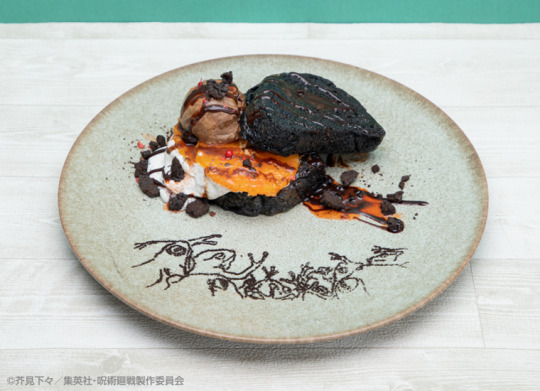
Megumi Fushiguro - Fitting Dark Garden Sandwich
Black French toast served with orange and chocolate sauce and chocolate ice cream.
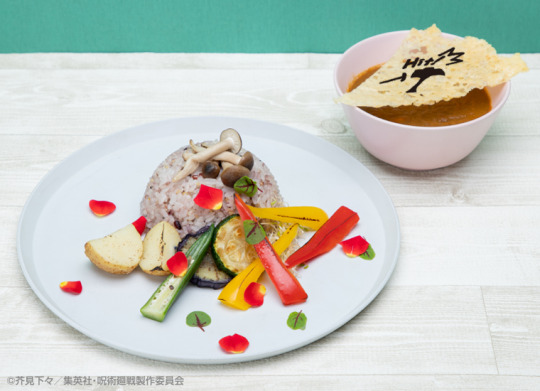
Nobara Kugisaki - Vegetable Spice Curry
Medium spicy millet rice curry with bell roses and vegetables. it comes with a cheese crisp as well.
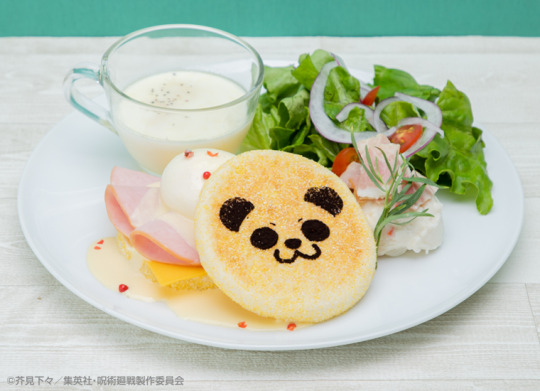
Second Years - Breakfast Plate
A plate of eggs benedict, Vichyssoise soup with non-powdered protein, and a pancake with a picture of Panda on it. The eggs benedict can be served with hot sauce if wanted.
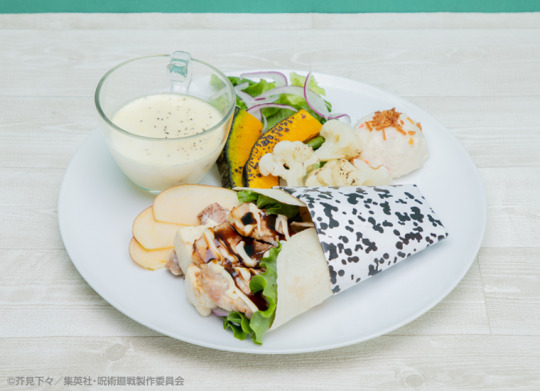
Kento Nanami - Apple Pork Wrap Sandwich
Balsamic flavoured apple pork sandwich with Camembert cheese, a small bowl of Vichyssoise soup, and potato salad.

Satoru Gojo - Fictitious "茈" cake
A whipped pancake that uses vanilla ice cream and berry sauce in the image of Gojo’s "茈" technique. The plate is decorated with blueberry sauce, has blueberries and raspberries, and has a silhouette of Gojo showing this technique.
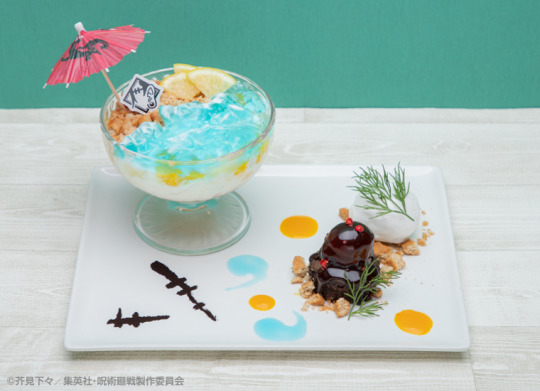
Area of Curses Plate
A dessert plate inspired by the curses (we know who you’re talking about 😉) who enjoy playing soccer on the beach. It comes with a yogurt and cheese parfait, a lemon sorbet, and a chocolate cupcake.
Drinks Menu

Yuji Itadori - Passion Cranberry Tea Soda
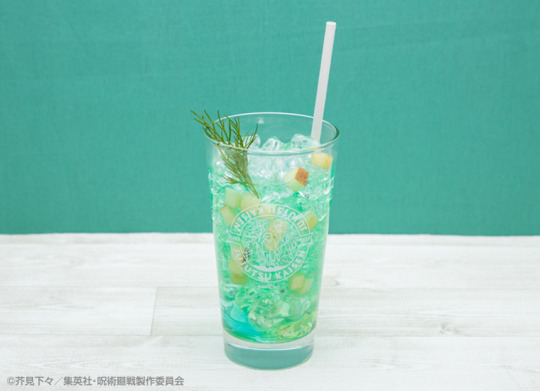
Megumi Fushiguro - Green Apple Mint Soda
Contains Ramune jelly at the bottom.

Nobara Kugisaki - Orange Rose Hip Tea Soda
Contains bell rose and raspberry.

Kento Nanami - Coffee Mojito Soda
Non-alcoholic (😂) lemon mojito soda with a side of espresso to pour in.

Satoru Gojo - Blue Hawaii Lemon Drink
Contains lemon jelly.

Gojo’s Hot Coffee
Since Gojo doesn’t like alcohol, here is a cup of hot coffee inspired by the scene where he puts a lot of sugar cubes in his coffee. ☕️
The goods list will follow in a separate post as this has became a monster post!! 😎
#jjk#jujutsu kaisen#itadori yuji#yuji itadori#yuji#fushiguro megumi#megumi fushiguro#megumi#kugisaki nobara#nobara kugisaki#nobara#satoru gojo#gojo satoru#gojo#kento nanami#nanami kento#nanami
86 notes
·
View notes
Photo

Fireplace surround (United States, 1901). Oak and glazed earthenware.
Designed by George Washington Maher (American, 1864–1926). Made by Louis J. Millet (American, 1855–1923).
Image and text information courtesy Art Institute Chicago.
56 notes
·
View notes
Text

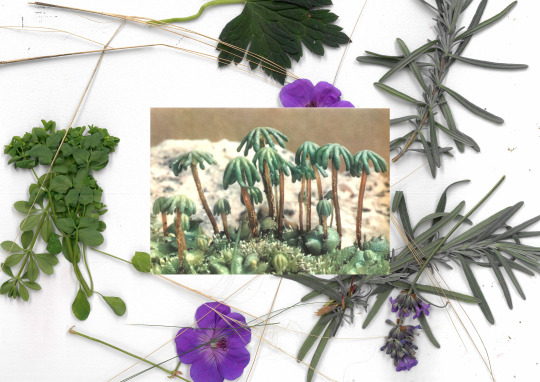
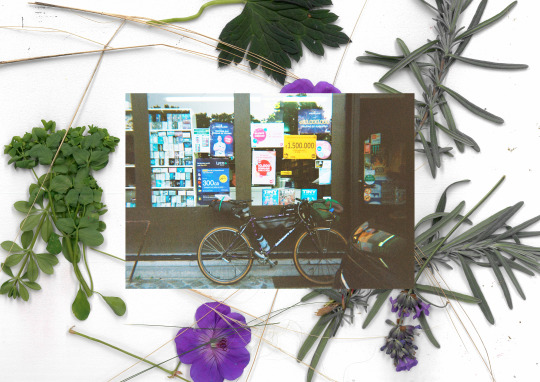
Mini Brief Designer as Author Taster workshop 01
Going outside the studio to find 3 things to collect. 'Collect 3 things which relate to your enquiry.
Consider the following:
How do you capture these things (ie. using photography, scanning, drawing, description and so on.)
What narrative are you beginning to shape by bringing these things together?'
I chose to pick flowers and leaves, herbs and cuttings from outside and scan them in. I wanted to design a background to show how my collection links to nature and the awareness of Gaia etc.
I followed by finding an old label for a gilet starring a camper or hiker cooking outside. (came from one of my fishermen gilets from vinted). I really like this piece of graphic design, it screams retro hiking graphics. I'd place it in the late 1970s. (Eurohike). Photos back then were soft film footage, Yellow tones and more rounded format (often) although this one is very sharp. Nature played a huge part in 70s graphic design no matter what the medium used. The bright yellow 'adventure' on the side, small caps with dark black type is a striking reminder that the guy making use of all of his big pockets, is on an adventure. But so is the buyer, this gilet will take you places and bring you back safely. The Eurohike logo from Millets is a classic green triangle reflecting the usual mountain shape. The composition of the label is designed in an almost collage-style where things have been placed manually where the designer thought they would fit best. It definitely makes me want to go for a hike :).
My second find was an image from a french book called Beautés du monde invisible from 1960. It's a scientific photograph of a weed called 'Liverwort'.
(MARCHANTIA POLYMORPHA)
They grow in moist cool areas and reproduce very rapidly seeing as they reproduce both sexually and asexually.
"Liverworts are considered the oldest lineage of terrestrial land plants"
I really love this photograph, the colours and the x10 zoom in remind me of claymation. More colours hinting back to retro photography, this time warm greens and browns. I enjoyed how the writer wrote (in french): 'In the Polymorphic Marchantia, which is part of the Liverworts, the female organs are carried on the underside of a serrated cap with a long peduncle. Wouldn't it rather seem like an arid tropical landscape devoured by thirst?'
When I first saw it, I obviously thought it was something tropical. They look like they're swimming in water and existing in slow-motion. An incredible reminder of how alive the world we live in is and this image reminds us how we might have possibly lost this connection as a lot of it is impossible to see with our eye sight.
2 notes
·
View notes
Text
hold the bright moon in my arms, ch. 1-2
Relationships: Niè Huáisāng & Wèi Yīng | Wèi Wúxiàn, Lán Zhàn | Lán Wàngjī/Wèi Yīng | Wèi Wúxiàn
Characters: Niè Huáisāng, Wèi Yīng | Wèi Wúxiàn, Original Characters
Additional Tags: Pining, Feelings Realization, Illnesses, ennui, Found Family, Porn Reading, Emotional Hurt/Comfort, Emotional Manipulation, Manipulative Niè Huáisāng, Memories, Wèi Yīng | Wèi Wúxiàn Needs a Hug, Post-Canon, Pining Wèi Yīng | Wèi Wúxiàn, Friendship, Niè Huáisāng Is A Little Shit, POV Wèi Yīng | Wèi Wúxiàn, POV Third Person, Qi Deviation, Resentful Energy
Second in the like mayflies wandering series. First fic is a grain of millet drifting.
Summary: Visiting Qinghe, Wei Wuxian tries to find peace, balance, and purpose. Nie Huaisang is not entirely helpful with this. Set largely CQL, but with frankencanon. Written for @wwxadhd in the @wangxiangiftexchange for Winter Solstice.
AO3 link
-------
Pretty much the only time Wei Wuxian spent in the Unclean Realm was during the Sunshot campaign, which wasn’t the best time for him or for the place. He was honestly glad his memory of the time was fairly spotty, owing in part to spending it as drunk as possible—it gave him the ability to make better memories instead of being immersed in those of war and death and grave dirt.
Nie Huaisang calling over the wall when they moved out for him, no one else, to take care, was one of a few that weren’t a blur of blood and pain. His friend, he knew now, was aware something was wrong, even if he didn’t know what, and apparently aside from wanting his brother safe, Wei Wuxian was one of the few others in the jianghu who held that perhaps dubious honor.
While his old friend had gained a reputation over the years as a know-nothing pitiful fop of a leader, he knew full well how carefully curated that image was after the fall of Jin Guangyao, knew better than anyone not to trust the assumptions of the cultivation world and gentry—who had, after all, painted him as a grave-robbing cannibal who stole children in the night, when in fact he’d been farming and trying to help a group of elderly refugees (and one child) survive at barely-subsistence level.
It was actually somewhat impressive that they managed to get one out of three right, though just thinking that put him off meat several days, made him don the warmest robes Nie Huaisang had supplied for him. For many reasons, he preferred to keep the memories associated with his first time in the Burial Mounds firmly locked away.
He was grateful Nie Huaisang didn’t pry, just had the kitchens make more dishes with tofu and, when he requested, multiple potato-based dishes. If he knew what put Wei Wuxian off meat, he never said, never even looked at him with pity—just accepted it and accommodated. It was possible he had guessed the reason, but Wei Wuxian appreciated his discretion.
Contrary to what outsiders might assume, Nie Huaisang was a formidable and capable leader, knowing when to delegate tasks not in his wheelhouse to his many able disciples, who all seemed to adore him as more of a didi than a zongzhu. It was a fascinating relationship, one borne out of love in a way Wei Wuxian wasn’t sure was even possible for other sects, making it more of a found family.
Unfortunately, he was also busy in the aftermath of his arrival, his spies reporting in constantly for things that he insisted needed to be handled in private. He could understand Nie Huaisang’s desire to work without him interrupting, and was happy not to get involved—he’d rather not be too involved with the jianghu, anyway. However, it meant Wei Wuxian was left somewhat aimless, and trying not to let himself get bored. Even Wei Wuxian knew that a bored Wei Wuxian was a troublemaking Wei Wuxian.
He only found himself at loose ends the first couple of days, doted on with the best available, whether it was food, as much talisman paper and art supplies as he could ever need, a pouch of tael and an open invitation to have a bevy of eager disciples accompany him to the market, a bed more comfortable than any he had ever slept in (save perhaps the jingshi), and soft, warm robes cut and dyed with Qinghe colors but for red accents the color of his ribbon…
He wasn’t stupid; he knew these details meant Nie Huaisang had been planning and preparing for his visit for some time, perhaps as long as he’d been alive again. If not longer.
Then when he was wandering the halls, the stony dank dimness of the Unclean Realm too much like that of the Demon Slaughtering Cave, feeling lost, a popo took his arm and led him to a crèche, multiple colorful rooms filled with children of all ages, some, he learned, orphans from the street.
“There are no street children in Qinghe,” the popo told him when he expressed surprise. “Zongzhu won’t permit it. If they can cultivate and wish to, they can become disciples. Otherwise they learn a trade.”
Another aspect, it seemed, of the Nie clan found family.
The operation was impressive, with educational areas for all ages, stations for play, stimulation, and learning, all designed to help the children find an interest that could become a career while playing.
“Zongzhu seeks street kids wherever he is, and brings them here,” a girl about A-Yuan’s age with a scar across most of one cheek told him. “I’m from Lanling. Mama was a prostitute.”
When her mother was dying and she was just a toddler, she said, she scarred her daughter’s face so she couldn’t become one herself, hoping she would have a better life as a servant. Instead the brothel owner threw her out once her mother was dead, just shy of four years old and still injured.
“I would’ve died in the gutter if Zongzhu hadn’t found me and brought me here.”
The girl had silver eyes and features that indicated who her father may have been, but she had taken the Nie name. She only helped at the crèche when her disciple duties permitted.
She seemed keen to talk to him about the crèche, unafraid despite knowing who he was and his reputation, which was refreshing among the sects.
Nie Huaisang, as it turned out, ran a network of people who brought him street kids from all over the jianghu, too. He paid them for each child they brought to the Unclean Realm, so it was a little like bounty hunting but meant to make lives better. Sometimes parents sold their own children to the Nie, and he permitted this, reasoning it was better for the child and the parents, who potentially had too many mouths to feed and would otherwise sell their children into prostitution or servitude. Sometimes an older child who was recently orphaned in nearby towns and villages would make their own way to the Unclean Realm, at times with younger siblings, word having spread that there was a good place to go. Wei Wuxian was certain some were likely runaways, escaping terrible pasts and families, but Nie Huaisang wouldn’t mind that either.
The crèche was wonderful for reasons that layered on themselves but amounted to his own orphanhood, and how much different life could have been had such a place existed when his parents died—all wrapped up in things he didn’t want to think about. Bittersweet, in a way, not that he would ever begrudge these children this happiness and stability.
A toddler wandered past him, waving a grass butterfly, and it was all the world like watching tiny Wen Yuan putter around with his own in the Burial Mounds, and all at once it was too much.
A-Yuan, who Lan Zhan rescued and made Lan Yuan. Lan Sizhui, whose name was like a declaration of something Wei Ying couldn’t figure out.
A-Yuan, who grew into an upright and righteous young man, without Wei Wuxian. He’d missed all those years, and there was no getting them back.
When he left Gusu, A-Yuan had not yet returned from his journey to Dafan with Wen Ning. There was so much to catch up on, but he didn’t know if he had the right to impose on Lan Sizhui, whose reputation would be better off if he didn’t associate with the Yiling Laozu, whether his name was partially cleared.
He retreated to his quarters, his peace broken by a ghost of memory, and made use of the high-quality paper and paints that had been in his room when he arrived. Wei Wuxian was only half-aware of what he was painting, and when he was able to focus again he found it was a watercolor of A-Yuan, when he was a toddler, and Wen Qing, the latter handing him a grass butterfly with a faint smile, the former grinning off the paper.
When it was dry, he bundled it up to send to the Cloud Recesses for Lan Sizhui. The youth was only just regaining his memories of those precious stolen years of life, and it could help spark memories of his gugu. She deserved to be remembered.
At dinner, he asked Nie Huaisang to send it. His old friend requested to see his work, and Wei Wuxian saw no reason to deny him.
“Skillfully painted, Wei-xiong.”
It was, disappointingly, all the feedback he got after a long moment of studied silence, at least until they were in the cups after dinner.
“I tried to talk to Dage. Then I tried to use my spies to smuggle her out, but it was too late. I’m glad the boy survived.”
Wei Wuxian hadn’t been aware Nie Huaisang knew Lan Sizhui was A-Yuan, but that made it clear.
“I didn’t know Hanguang-Jun had saved him, not until later. They were careful, thank the heavens.”
Or the jianghu would have called for a toddler’s blood, he means, Wei Wuxian knows. If they came to know, they still might, but he knew Lan Zhan would destroy anyone who tried.
If anyone tried, Wei Wuxian would ensure they never reincarnated. He could become the monster they expected, if it meant protecting A-Yuan.
Wei Wuxian eventually asked about the crèche, mentioning the girl he met. Nie Huaisang looked pensive, taking a deep drink of liquor before answering.
“It started right after you, well… She was the first. I came across her in an alley in Lanling at the next discussion conference. They were celebrating and I needed air… and I couldn’t just leave her. Dage was just glad I was taking interest in something, so he let me bring her home.”
He was quiet for a long time, and Wei Wuxian could imagine much of what he wasn’t saying.
“Her mother named her Wei, 维, like her name would safeguard her. I gave her the courtesy name Yingwei, 英维—you know we Nie give them to female cultivators just like male. I told her she could be a hero and save others as a cultivator, and she took the Nie name when she became a disciple.”
Wei Wuxian nearly choked on his wine. No wonder the girl had been comfortable talking to him—she’d been named in his honor. He didn’t really know how to feel about that; first Sizhui, now Nie Yingwei.
“I just kept bringing them home when I encountered them, got some grandmothers whose kids died in the Sunshot Campaign to move to the Unclean Realm and work with them, hired tutors, and it just kind of took off from there.”
He didn’t bring up the girl again, just told him about how he expanded it to women and children escaping abuse, even former prostitutes.
“We even ran across some of those awful trafficking rings—those ones that steal kids and women and sell them into slavery—and got rid of them. I’m not good at cultivation or fighting, but this was something I could do to make the world a better place, like you and Hanguang-Jun. The jianghu saw it as a frivolous thing since it didn’t involve improving life for the gentry. And Jing Guangshan hated it, but he couldn’t do anything about it even as Chief Cultivator.”
It was a conversation far more serious than most he’d had with Nie Huaisang, who seemed almost embarrassed by what he perceived as only a minor thing.
Wei Wuxian disagreed entirely, and refreshed both of their cups of wine.
“To making the world a better place, through cultivation or administration,” he said, holding his cup up in a toast. “And to giving orphans family.”
Nie Huaisang smiled, raising his cup and drinking deeply, and conversation turned to more trivial matters, with his old friend decrying how much amazing poetry and literature he’d missed while he was dead, insisting Wei Wuxian visit the library in the coming days.
Once they were deeper in their cups, Nie Huaisang turned back into the boy he once knew, no trace of the manipulator, complaining at length about the duties he couldn’t delegate that prevented him from painting and reading spring books as he wished.
“Ah, I have so many I haven’t gotten to read yet! I got my hands on a rare cutsleeve series, even, and it’s just gathering dust.”
That brought to memory the book of cutsleeve porn he’d pranked Lan Zhan with back before the war in the library.
Nie Huaisang remembered that, too.
“You never did get to read that one,” he said, lolling in his seat. “I did replace it, so you should finally get the chance.”
Wei Wuxian could only laugh and help his far-too-drunk friend to his quarters, handing him off to a servant who looked at his zongzhu with fond exasperation.
The next day after the midday meal, Wei Wuxian found a stack of cutsleeve spring books on the desk in his room, including the series Nie Huaisang must have been referring to.
It was entitled “Unity: The Lords of Light and Dark.”
-----------
Yingwei is using the character 英 for hero/brave and 维 for safeguard. Wei has a different pronunciation from the wei in Wei Wuxian’s name. Ying has the same intonation.
wangxianling on Twitter has an amazing thread discussing the meaning of Chen Qing Ling, and mentioned that the chen in 陈情 (chenqing) has the same tonal pronunciation as the chen in Bichen (避尘), and bichen(qing) = Bichen; (bi)chenqing = chenqing; you in me and me in you, unity, when you swap the chen characters. Hence the title of the cutsleeve porn. There’s more in the thread that’s pretty interesting, but I wanted an homage to mxtx there.
Of course, the series was commissioned by a certain someone. He commissioned graphic novel fanfiction of his favorite couple that never was. Because nhs may be a manipulator, but he’s also a sap.
-------------
Chapter 2
Wei Wuxian opened the first book to a random page, curious, and immediately slammed it shut again, his face hot.
The Lord of Light didn’t just share Lan Zhan’s title, as he had first expected; instead the character was modeled after Lan Zhan entirely—and he somehow doubted anyone asked his permission!
He was certain they didn’t, because the Lord of Dark was modeled after him, including that damn title ‘Yiling Patriarch,’ though they’d certainly not realized the scars Wei Wuxian had carried at the end of his first life.
He didn’t think anyone would have managed to see either of them naked. Some of it had to be the stuff of fantasy, but their likeness was unmistakable.
And he’d opened it to a page where they were… they were…
Yes, definitely some things were the stuff of fantasy, if proportions were any indication, he thought.
Still, the image was burned into his brain, seared into his heart like a brand.
Nie Huaisang had said it was rare, which made sense. He could imagine Lan Qiren hunting down copies and burning them in outrage, which was actually something of a funny image.
Did people actually think they were…? Was this some strange fixation in the world that he’d managed not to encounter?
And, oh gods, did Lan Zhan know? Was that why he’d let Wei Wuxian leave?
Wei Wuxian felt unmoored, the world scrutinizing him again, and that image…
It was as though he’d managed, all this time and through both lives, not to examine his sort-of obsession with Lan Zhan and what it might mean, and now with that door so firmly shut, when his reputation would only hurt the Chief Cultivator, seeing that…
How could so many people know how Wei Wuxian felt before he did?
He felt scrutinized by the world, flayed open and raw for all to see in a way he had not felt since the confrontation at the Guanyin Temple and the realization that Wen Ning had told Jiang Cheng about the golden core transfer.
It felt like a million voices screaming in his ears, like the resentful spirits trapped in the Seal, in Burial Mounds, or like he was surrounded by enemies shouting at him.
Noise registered around him, his name, maybe, but he couldn’t focus. A needle pricked his neck, and he recognized it as the prelude to oblivion and welcomed the darkness as it came.
——
When he opened his eyes, he found himself in an infirmary, Nie Huaisang beside him looking distraught.
“Wei-xiong, Wei-xiong, you’re awake!”
A healer rushed in, followed by several assistants, and they poked and prodded him and shushed Nie Huaisang while examining him.
Wei Wuxian wasn’t quite sure why he ended up here, and when he tried to piece it together he remembered the book…
“I’m sorry, Wei-xiong! I didn’t think the books would cause you to have a qi deviation!”
The words startled him out of another potential spiral.
Qi deviation? Well, that explained why he felt like shit. He hadn’t felt pain like this since near the end of his first life, when just existing was exhausting.
“I didn’t think I was far enough along in cultivating my jindan for that,” he said, as it was the second thing to pop into his head.
He barely had a jindan, after all, just a fledgling tiny thing. Wei Wuxian wasn’t an expert in jindan, but he hadn't thought one so small would be subject to a qi deviation.
“A mild qi deviation,” the healer clarified crisply. “And you flooded your quarters with resentful energy.”
“Scared the crap out of the servants,” another voice added.
Wei Wuxian turned to find Nie Hengxiang at the door, looking unnaturally tense—wouldn’t it figure if this scared the teen away?
“They thought one of your experiments got you,” he said. “Glad it wasn’t worse.”
Nie Huaisang was practically wringing his hands.
“I didn’t think you’d react like that, Wei-Xiong,” he murmured, and Wei Wuxian could see his distress was no act. “I just thought a little nudge…”
The world felt fuzzy again as he realized Nie Huaisang had done this intentionally. His throat burned and he coughed, spraying flecks of blood against his palm. The healers fluttered around him, but what drew him back to himself was Nie Hengxiang’s hand gripping his shoulder.
“Wei-qianbei, breathe.”
Oh, maybe the kid wasn’t scared of him, after all? The thought brought the world back into focus.
“—told you he was likely delicate after being brought back from the dead,” the healer was lecturing Nie Huaisang. “No more undue stress!”
Nie Huaisang took it, looking for all the world like a scolded child.
“Nie-xiong,” he started, but his voice was barely a croak.
A healer pressed a cup of tea in his hand, and when he sipped he found it had honey and soothed his throat. He cleared it and tried again.
“Nie-xiong, just how rare is that series?”
If anything, Nie Huaisang looked more dejected.
“It’s the only copy,” he admitted after shuffling guiltily. “I commissioned it. Before. I thought we’d have a good laugh when the Wens and you were safe and you and Lan Wangji married, but it never happened.”
Wei Wuxian’s head throbbed. At least this likely meant that what he’d only come to realize for himself wasn’t some spectacle for the common people. That it wasn’t why Lan Zhan hadn’t asked him to stay—he’d almost certainly never seen this copy or it’d be in shreds.
Which is where it would be if it was still in his quarters when he returned.
“Hide it well, or there will be none,” he finally said, deciding to give him the benefit of the doubt. “And just talk next time? No more games. I’m so tired of games.”
He winced when his voice broke on the last word, maybe emphasizing a bit too well how wrung out he felt.
Nie Huaisang nodded almost frantically, and only put up minor resistance when the healer who had been scolding him herded him toward the door like some sort of wayward child.
Nie Hengxiang patted his back with almost comical gentleness before following, and Wei Wuxian consigned himself to the prodding of the healers, the bitter medicine, and tried not to think of Wen Qing.
It was nearly two days, most of it spent in a drugged sleep to promote healing, the damage to his meridians being repaired by healers as he slept, before he was cleared to leave the healing ward, though he had several visitors in his waking hours—including Nie Hengxiang, who told him how they had cleared the resentful energy from his quarters using some old talismans he’d designed for removing it from land so the Wen remnants could plant crops, and Nie Yingwei, who brought card games and beat him soundly at each one and made no mention of anything but the silly antics of the children at the crèche.
Nie Huaisang escorted him to his quarters personally, looking somewhat frazzled. While his old friend had visited him, they had not yet discussed what he had wanted to ‘nudge’ and why.
When they arrived, he found it well-stocked with Emperor’s Smile, and he turned a questioning gaze to Nie Huaisang, who fidgeted with his fan for a moment.
“The Chief Cultivator sent it to me, since Qinghe is hosting you.”
Wei Wuxian wasn’t sure what to make of that, but there were several unopened letters on the desk, and he recognized Lan Zhan’s handwriting among them even from a distance.
When they were seated at the low table in his greeting area, with tea and and cakes (no wine, as he was banned for the next week by the healers), he sipped his tea idly and waited for Nie Huaisang to crack.
It didn’t even take a ke.
“I really thought you’d stay in Gusu with Hanguang-Jun,” he started. “I thought you two had finally cleared things up, and then my spies reported you left.”
‘Cleared things up’ seemed to belong with ‘nudge,’ and merited further exploration, but Wei Wuxian left it for now.
“And they said I was in danger,” he prompted.
Huaisang looked cagey for a moment, then sighed.
“No. I just know how the gentry are, so I sent A-Xiang to shadow you. I hate that I was right.”
A knock at the door interrupted them, and a servant entered with a tureen of hearty vegetable soup, along with Healer Nie carrying a bowl of medicine. Wei Wuxian was impressed with their diligence; despite the qi deviation, his meridians felt in better shape than they had been since the core transfer, since before the Burial Mounds and being flooded with resentful energy.
He took the bitter concoction in one long draught, a skill tempered at the hands of Wen Qing, and was happy to follow it with stew, focusing on eating.
As expected, Nie Huaisang continued unprompted once they were alone.
“But you and Wangji-xiong… All those years, I thought you’d wind up together.”
Nie Huaisang’s tone lilted in question, and Wei Wuxian mulled a response over a bite of stew.
“He sees me as a friend, I hope,” he settled on.
His old friend made a choking sound, and he looked up to see an aghast expression on his face, one purely authentic and definitely unmasked.
“Wei-xiong, he wore mourning white the entire time you were dead. He wouldn’t look or speak to Jiang-xiong,” Nie Huaisang said slowly, and Wei Wuxian felt a little talked down to. “He raised your son.”
“A-Yuan isn’t my son,” he deflected, setting his spoon down lest it shake in his hand, not quite sure how to handle these revelations.
Sure, he’d joked that Lan robes were like mourning robes, but that was a bit of a stretch. And who knew what had happened between Lan Zhan and Jiang Cheng—Jiang-zongzhu or Jiang Wanyin, he reminded himself; what right did he have to call him so intimately? For that matter, what gave him the right to call Hanguang-Jun intimately?
“And Lan Z—Lan Wangji was just doing the right thing.”
Nie Huaisang let out a sound somewhere between a groan and a growl, his fan raised as though he intended to use it as a weapon.
“He’s in love with you, you—you…”
The fan lowered, but Wei Wuxian barely noticed, too startled by Nie Huaisang’s words, said with such certainty.
“You really don’t know, do you?”
Wei Wuxian focused on his face again, only to see a look of profound pity.
“Wei-xiong, your Lan Wangji has been in love with you since the lectures. Erge worried, the entire time you were gone, that he’d grieve the rest of his life. I eavesdropped on him and Dage enough to hear all about it.”
Wei Wuxian could only sit numbly as Nie Huaisang outlined how Lan Zhan wanted to bring him back to the Cloud Recesses, to hide and protect him; how Lan Xichen had worried he could become their father; how he’d found Lan Zhan, drunk and barely conscious and seeking Chenqing, the fresh Wen brand burned into his chest; how Lan Zhan had barely spoken to anyone older than those who were children when the Siege of Burial Mounds occurred, blaming all disciples who took part as culpable in Wei Wuxian’s death; how Erge knew the Lan love curse would mean he would never love again, spend his life alone; how Lan Zhan blamed Jiang Cheng for his death and no meeting between the two went well, so often leading to troubled relations between the sects that it had led to what Erge called the Wangji Protocol, enlisting A-Yuan and Lan Jingyi to help handle such situations, which certainly explained the show at Dafan Mountain…
Lan Zhan hadn’t wanted to punish him? was really the first reaction he had.
And apparently he said that out loud because Nie Huaisang scoffed.
“Not at all. He knew the gentry would turn on you, that you weren’t safe. That you would rub them wrong and become a target. Hell, I knew that and there wasn’t anything I could do to stop it, either!”
Something in his voice caught Wei Wuxian’s attention, the end almost a wail, and he refocused to find Nie Huaisang fighting tears. Then he recognized the regret, the guilt, and he was reminded again that his old friend had singled him out as they rode to war, calling to him and him only to take care. Like he’d known, even back then.
He knew Lan Zhan carried guilt from his confession when he was drunk during their travels, but he’d had no idea Nie Huaisang felt similarly.
A part of him wondered if Jiang Cheng also felt that way.
“Hey,” he said, reaching out to put his hand on Nie Huaisang’s shoulders. “Nie-xiong, don’t do that. Nothing could have been done. I knew I was on borrowed time when I dragged myself out of the Burial Mounds, and still I got more than I expected.”
He knew immediately it was the wrong thing to say, Nie Huaisang crumpling against him and letting out a sob against his shoulder in a display that shows what the naming of Nie Yingwei already made clear. That his friend had missed him dearly, had believed in him, that he was no monster. That he had more people who had grieved him than he expected.
Mianmian’s face somehow came to mind, the joy and relief at seeing him pop up from behind the haystack.
More people, indeed. He thought perhaps he should write her, maybe strike up a correspondence.
Nie Huaisang’s crying was nothing like the display he’d made in Carp Tower, and felt like years of pent-up grief. Carrying this, it seemed amazing he hadn’t broken down in the inn after Lan Zhan caught him, knowing who he was, that it hadn’t blown all his plans apart.
All he could really do was pat his back and make awkward comforting noises, so he did.
Eventually his friend subsided and sat back, looking embarrassed.
“I knew something was wrong, but not what. I honestly didn’t think it was the Burial Mounds. I didn’t think even you could make it out, despite the rumors. When I heard Wen Qionglin’s words, everything made so much sense.”
Wei Wuxian realized he must have seen the confrontation at Lotus Pier, likely sneaking around. So he knew the truth as well, of the transfer. The truth that only Jin Guangyao had ever guessed. Or, worse, it was a spy who related it to him.
How many people knew?
He felt raw, like a patch of skin healing from a scrape.
“Wei-xiong, your nose.”
Nie Huaisang let out a concerned noise, reaching forward with a cloth to dab at his nose, the fabric coming away stained with blood. His hands fluttered a bit as though he was uncertain what to do, then he rushed to the door, opening it to yell for someone to get a healer before rushing back.
Wei Wuxian sagged a little, wrung out. He didn’t feel like he was having a qi deviation, which he knew Nie Huaisang thought. Just tired, so tired. A little like he did at Lotus Pier before…
———
Darkness ebbed and he found himself on his bed, a concerned healer leaning over him, examining his eyes as he came to. Behind her, Nie Huaisang was hovering, fan fluttering anxiously. The woman made a considering noise before returning her attention to the herbs she was grinding with a mortar and pestle.
Her explanation had to do with the heart governing the blood—his emotional state had overwhelmed his heart and overheated his blood, hence the nosebleed. Only a slight disharmony in qi, not a deviation.
Not that a disharmony wasn’t dangerous, he knew, as any could become worse, as his last one had. Deviations happened when a disharmony was too powerful, just a result of that disharmony. It meant he would need regulation through meditation and medicine until the root cause was healed.
“I’ll speak to the kitchen about adding more yin foods to your diet and removing yang. Which means no alcohol or chili sauce, Wei-gongzi.”
For a moment Wei Wuxian wanted to laugh at the idea of the Yiling Patriarch needing yin foods, but he also suddenly realized the only way he’ll ever eat spice again is if he talked with Lan Zhan. And maybe, given the incident at Lotus Pier, Jiang Cheng. He didn’t know which was more fraught.
He could get used to bland food… but the doctor was explaining his dietary restrictions to Nie Huaisang and the list was all rabbit food, and a wave of homesickness washed through him, all of it reminding him of the food at the Cloud Recesses, of Lan Zhan.
Who was apparently… in love with him?
Nie Huaisang had gained a reputation as a know-nothing, but Wei Wuxian knew he was anything but. The man had traded in information dancing on the edge of a knife blade for the last decade, so it stood to reason that his information would be accurate.
At the same time, having only just figured out his own feelings, it was hard to come to terms with all he’d learned and actually believe it.
“The Cloud Recesses has texts on healing disharmony,” he tuned back in to hear the healer say. “Zongzhu, you should write to Hanguang-Jun.”
He glanced at Nie Huaisang, who was cowering a bit.
“If he knows Wei-xiong had a qi deviation because of me, he’ll kill me!” he wailed.
Lan Zhan had been protective of him the entire quest to find the rest of Nie Mingjue’s body, and particularly in hindsight there were moments that now flustered him—his joke about getting undressed in the street to prove the curse mark was under control, for instance. Now the brief look Lan Zhan had given him, his eyes raking up and down his body, had a whole different context, one that made his face burn.
He really hadn’t intended to be that shameless.
Wei Wuxian sighed, knowing there was no getting around it.
“And if he knows I had one and you didn’t tell him, what would he do?”
Nie Huaisang paled, fidgeting with his fan, before ultimately deflating.
“Just… distract him?” he pleaded, and then a sly little grin ghosted across his face. “Well, you probably won’t be able to help but distract him!”
Something in his tone implied how, and his waggling brows made the meaning clearer.
Face on fire, Wei Wuxian grabbed the nearest thing, which turned out to be a candlestick, and threw it at Nie Huaisang, who dodged easily and danced from the room with a giggle.
The healer muttered half-hearted obscenities and complaints about her childish zongzhu under her breath as she made him rest back again and went back to preparing medicine, leaving him with his thoughts.
Tian na, this meant Lan Zhan would likely come to Qinghe, he realized, which was what Nie Huaisang had been referencing in his teasing. He flung his arm over his face with a groan.
It was a relief when the healer assumed he had a headache and gave him a medicine that made him sleep, giving him respite from having to think about it for now.
------
Lots of reference to traditional Chinese medicine in here.
Tian na is similar to “oh heavens/oh god.”
#the untamed#untamed fanfiction#mo dao zu shi#mdzs#wei wuxian#wei ying#nie huaisang#untamed fanfic#untamed fic#mdzs fanfic#mdzs fanfiction#mdzs fic#cql#chen qing ling#cql fanfic#cql fanfiction#cql fic#my fanfiction
8 notes
·
View notes